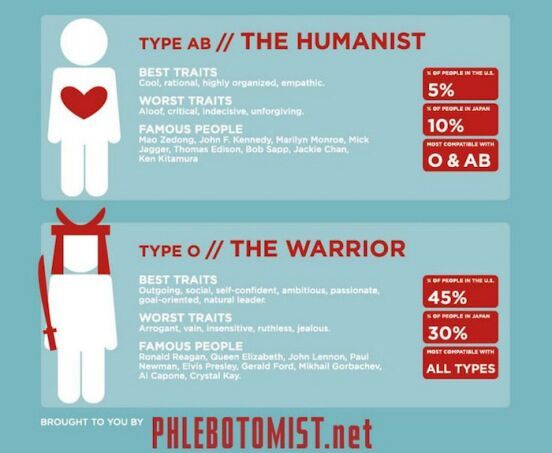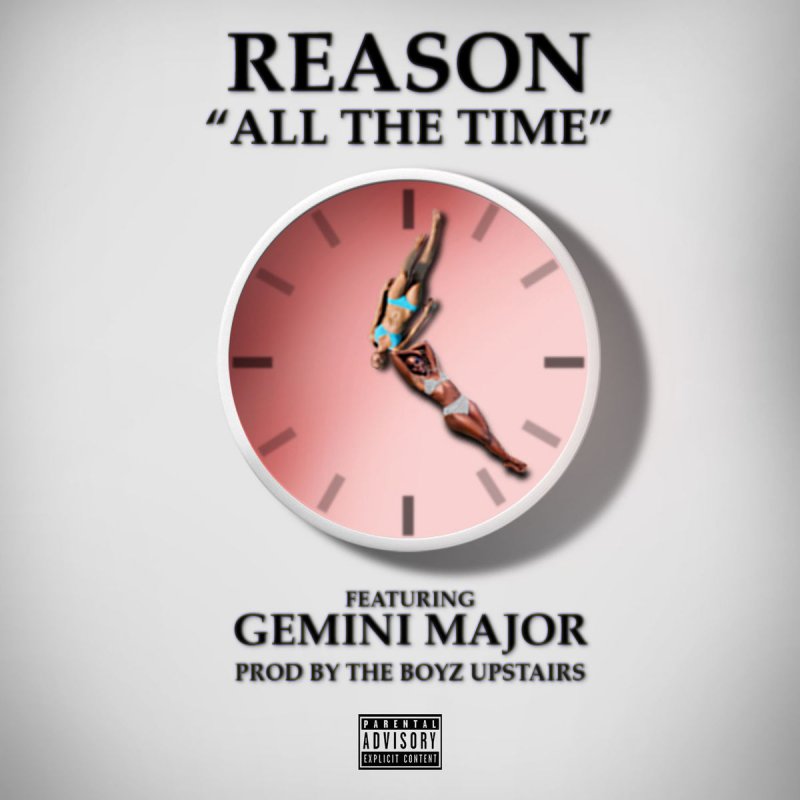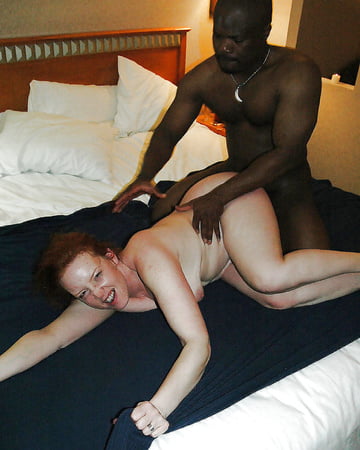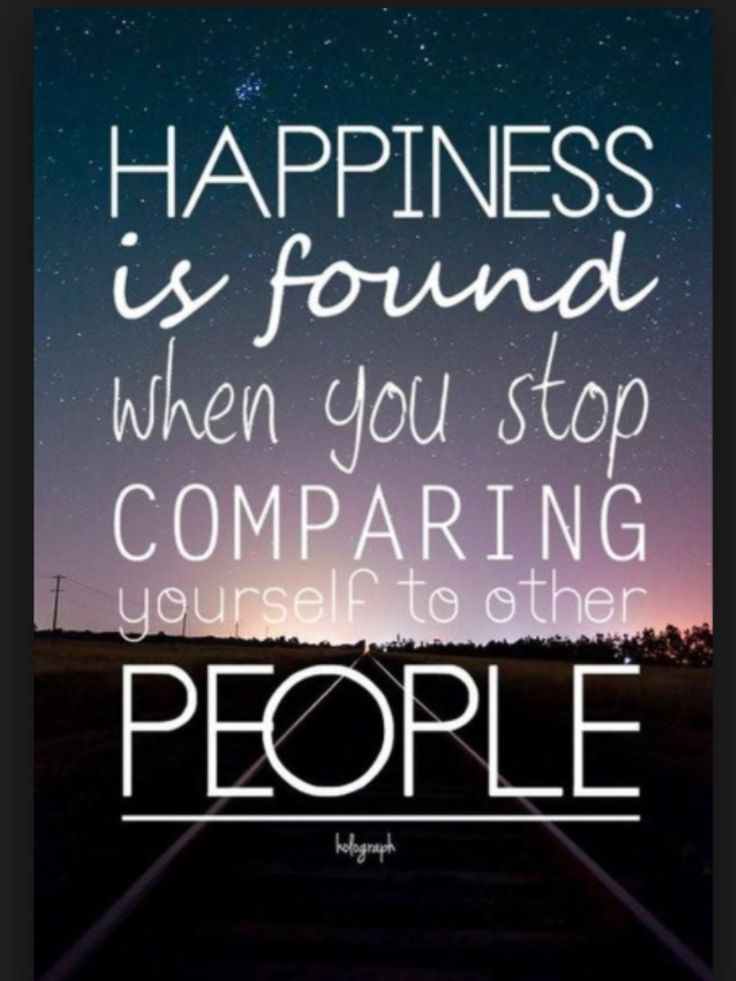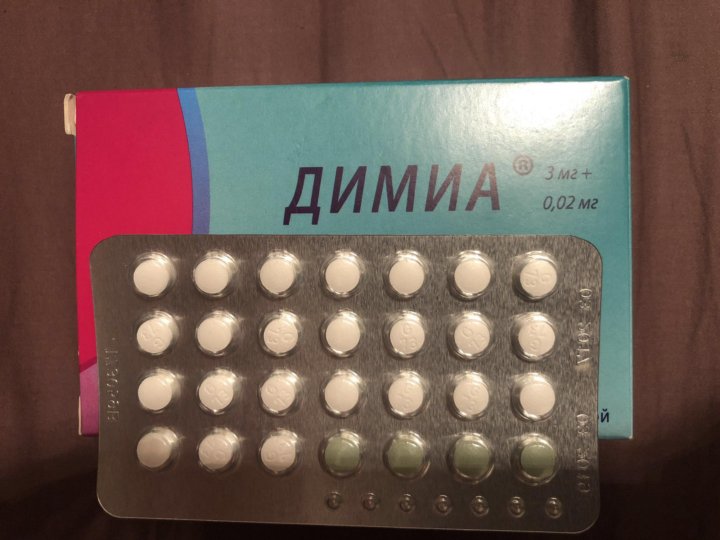Japanese blood types and personality
Japanese Blood Type Personality Theory And You
Do you know what blood type you are? What about the blood type of everyone in your family?
I do, and I even know the blood type, or ketsuekigata 血液型, of all my friends, too. And I'm not alone. According to a 2016 survey of 3,355 Japanese people, 99% knew their blood type.
Wow! But why all the blood knowledge?
- 血液型(けつえきがた)
- blood type
In Japan, blood types are considered an important indicator of a person's personality. It's known as the "Japanese Blood Type Personality Theory." Though this may seem far-fetched, a lot of people believe in it. In fact, the aforementioned survey shows 29% of males and 45% of females believe.
If you're planning on visiting Japan or interacting with Japanese people, read on. Understanding Japan's obsession with blood types can help you make new friends and fit in with Japanese groups. Plus, you'll find out where these beliefs came from and why it has such a hold on the Japanese consciousness.
- Japanese Blood Type Personality Theory
- Blood Type A
- Blood Type O
- Blood Type B
- Blood Type AB
- Blood Type Personality Compatibility
- Marriage Success by Blood Type
- Blood Type Personality Theory as a Cultural Movement
- Blood Type Books
- Blood Type Movies
- Blood Type Dating Services
- Other Blood Type Products
- History of the Blood Type Personality Theory in Japan
-
- Anti-Blood Type Bullying Movements
- Japanese Blood Type Personality Theory and You
Japanese Blood Type Personality Theory
Japan's interest in blood types comes from the idea that a person's blood helps define their personality. There are personality traits for each blood type.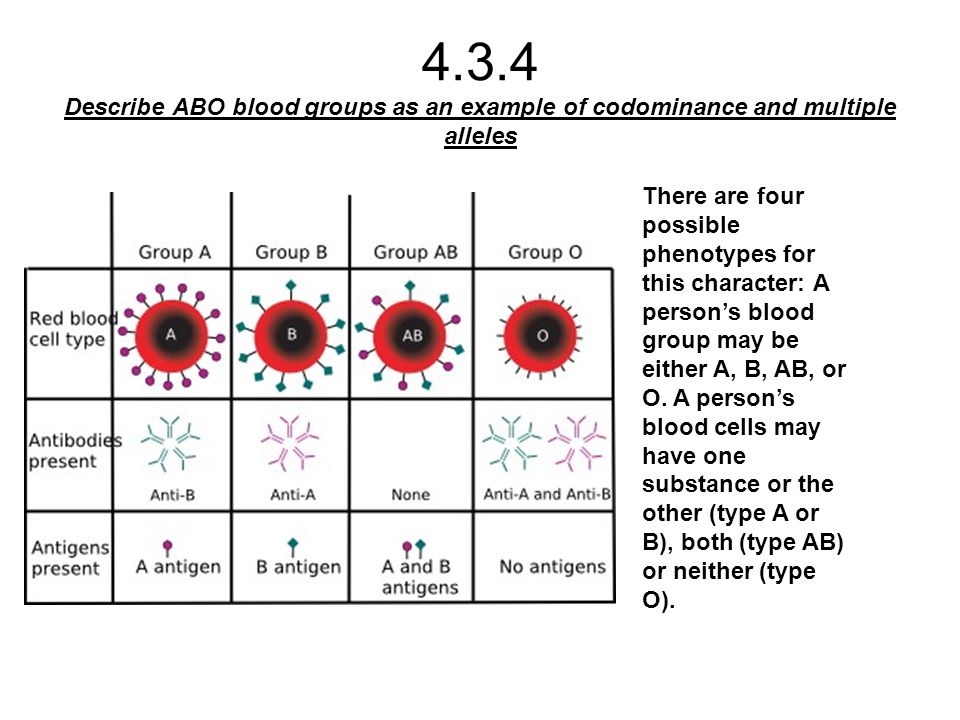 When someone acts a certain way, Japanese people like to tease, saying, "Of course you'd do that, you're B," and so on. It facilitates communication and helps people feel more open with one another.
When someone acts a certain way, Japanese people like to tease, saying, "Of course you'd do that, you're B," and so on. It facilitates communication and helps people feel more open with one another.
Blood types also help Japanese people decide if they're good match, romantically or otherwise. Certain blood types pair well and promote better relationships, or so the thinking goes.
So when a Japanese person asks:
- 血液型、 何 型?
- What blood type are you?
Don't freak out! No one is asking you to donate blood. The question merely expresses curiosity about you as a person. If you've ever been asked, "What's your sign?" in English, it's the same idea.
Now for the fun stuff! Want to find out if your personality matches your blood type? Take a look at the chart below to find out. And don't worry if you're positive or negative.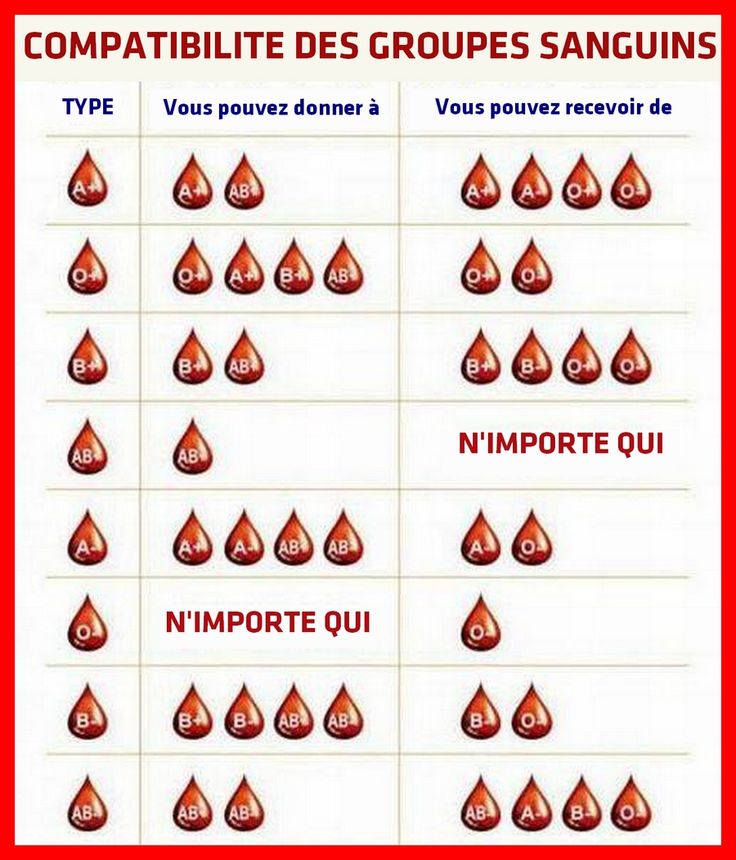 That matters in medical situations, but doesn't affect you here.
That matters in medical situations, but doesn't affect you here.
| Blood Type | Ratio in Japan | Positive Traits | Negative Traits |
|---|---|---|---|
| A | 40% | Earnest, Neat | Stubborn, Anxious |
| O | 30% | Easygoing, Leadership Ability | Insensitive, Unpunctual |
| B | 20% | Passionate, Creative | Selfish, Uncooperative |
| AB | 10% | Talented, Composed | Eccentric, Two-faced |
To get a clearer idea of how these blood type personalities play out, here's a picture from Twitter that demonstrates it well.
“@gdgdtoday: 血液型の違う家族がみかんの皮を剥いたところこうなりました。クスッとして思わず共感した方、そっとRTで教えて下さると嬉しいです(笑) http://t.co/DurVlocV”
— れぃれぃ(締切10月末は死が見えますね) (@leilei010101) December 13, 2012
違い過ぎ素敵w
Mikan were peeled by four family members with different blood types
- Mom, A: peeled the orange cleanly.
- The picture poster, AB: peeled artistic shapes.
- Dad, B: peeled roughly and wrapped it around a used tissue.
- Younger brother, O: broke the peel into small pieces and made a mess.
This is just the tip of the iceberg though. Let's dive deep into these giant pools of blood. If you know your blood type, try and see how well these descriptions match you.
Blood Type A
Most of the Japanese population is type A. People with this blood type are described primarily as kichōmen 几帳面, or well-organized. They like to keep things neat but can be stubborn and get stressed out easily. They also value harmony with others. Agricultural people are the root of blood type A, and it's been said working collaboratively on farms developed these blood type personality traits.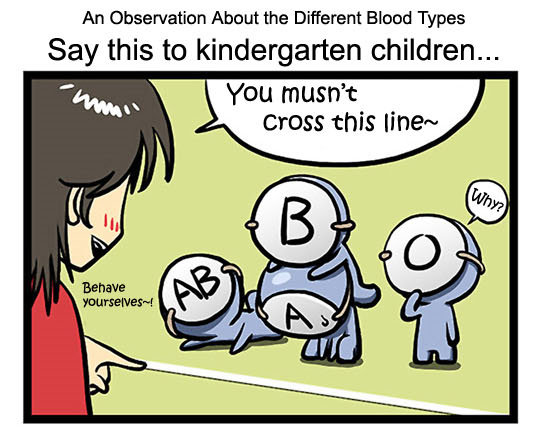
- 几帳面(きちょうめん)
- well-organized
| Timid | Mild-mannered | Anxious | Earnest |
| Sensitive | Stubborn | Intense | Reserved |
| Patient | Responsible | Fastidious | Tense |
| Tactful | Shy | Withdrawn | Polite |
| Perfectionist | Stressed | Conscientious | Wary |
| Kind | Diligent | Attentive | Composed |
| Reliable | Nervous | Neat |
Blood Type O
Blood type O is often described as rakkanshugi 楽観主義, or optimistic. They are outgoing, have leadership abilities, and are able to set the mood for groups of people. They don't care much about little things (as you can see from the mikan picture above), so their behavior sometimes freaks out more sensitive A types. Though they're often late to events (and sometimes rude), O types are incredibly resilient and flexible, enabling them to roll with the punches.
They don't care much about little things (as you can see from the mikan picture above), so their behavior sometimes freaks out more sensitive A types. Though they're often late to events (and sometimes rude), O types are incredibly resilient and flexible, enabling them to roll with the punches.
- 楽観主義(らっかんしゅぎ)
- optimistic
| Optimistic | Easygoing | Leadership Ability | Insensitive |
| Unpunctual | Calm | Confident | Self-determined |
| Strong-willed | Intuitive | Self-centered | Cold |
| Unpredictable | Workaholic | Outgoing | Energetic |
| Social | Flexible | Realistic | Financially-minded |
| Resilient | Romanticist | Cautious | Devoted |
| Peaceful | Carefree | Impressionable | Insecure |
| Emotional | Ambitious | Trendsetter | Independent |
| Loyal | Athletic | Robust | Passionate |
| Agreeable | Arrogant | Vain | Jealous |
| Ruthless | Rude | Imitator |
Blood Type B
Blood type B is generally described as jikochū 自己中, or selfish.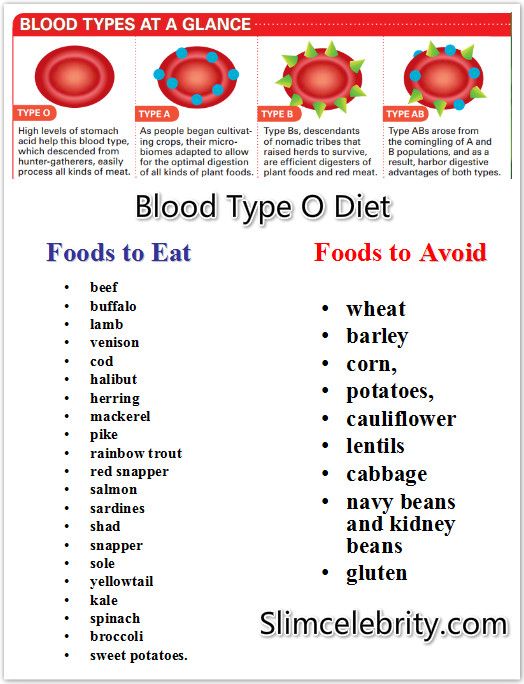 They are also known for their creativity. Blood type B has a strong sense of curiosity, but at the same time, loses interest easily. Though there are a lot of positives to B types, people tend to focus on the negatives for reasons we'll get into later. Some say their root is in nomadic peoples who roamed from place to place.
They are also known for their creativity. Blood type B has a strong sense of curiosity, but at the same time, loses interest easily. Though there are a lot of positives to B types, people tend to focus on the negatives for reasons we'll get into later. Some say their root is in nomadic peoples who roamed from place to place.
- 自己中 (じこちゅう)
- selfish
| Selfish | Passionate | Erratic | Wild |
| Active | Uncooperative | Creative | Strong |
| Irresponsible | Unforgiving | Relaxed | Freewheeling |
| Unconventional | Unpretentious | Pragmatist | Flexible |
| Curious | Cheerful | Outgoing | Adventurous |
| Indecisive | Unpredictable |
Blood Type AB
Blood type AB is a hybrid of A and B, two different personalities mixed together.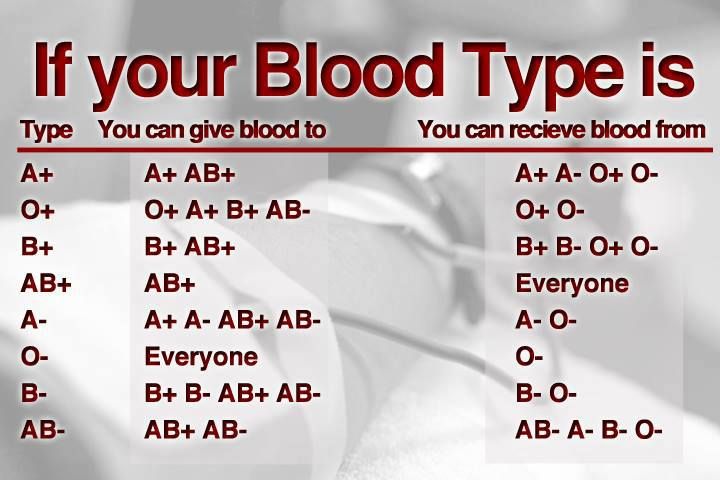 They are often seen as dual-natured and complicated. For example, they are shy like A types, but also are outgoing like type B. Blood type AB is the rarest in Japan (and many other places in the world, too), so they are hard to find. This reinforces the stereotype that AB people are kawarimono 変わり者, or eccentric.
They are often seen as dual-natured and complicated. For example, they are shy like A types, but also are outgoing like type B. Blood type AB is the rarest in Japan (and many other places in the world, too), so they are hard to find. This reinforces the stereotype that AB people are kawarimono 変わり者, or eccentric.
- 変わり者(かわりもの)
- eccentric
| Talented | Composed | Rational | Artistic |
| Aloof | Cool | Two-faced | Controlled |
| Sociable | Critical | Indecisive | Forgetful |
| Irresponsible | Shy | Outgoing | Trustworthy |
| Self-centered | Sensitive | Dream Chaser | Spiritual |
| Calm | Mysterious | Vulnerable | Complicated |
| Private | Creative | Eccentric | Charming |
| Impatient | Proud | Diplomatic | Discriminating |
| Popular | Adaptable |
Blood Type Personality Compatibility
You might be wondering which blood types get along with each other.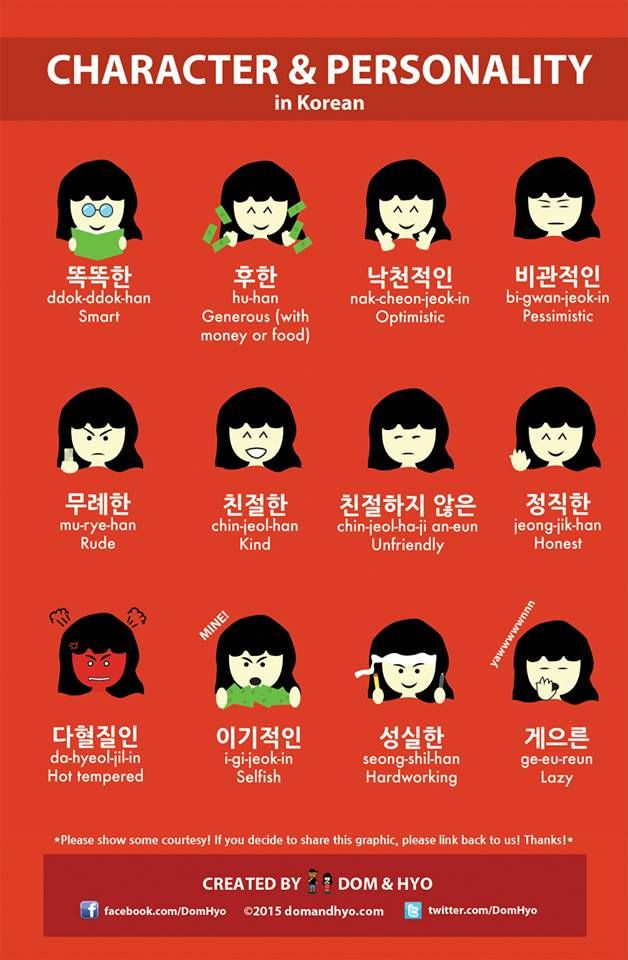 Compatibility can differ depending on how the stereotypes are interpreted, so let's dig into how relationships work in the Japanese blood type personality theory.
Compatibility can differ depending on how the stereotypes are interpreted, so let's dig into how relationships work in the Japanese blood type personality theory.
-
A × A: These similar personalities generate empathy and affection, but sometimes create irritation because both people are so intense.
-
A × O: Type A and Type O have very different personalities (A is sensitive, but O is not). They cover each other's weaknesses, but the differences may stress them out.
-
A × B: Type A envies Type B's ability to enjoy things at their own pace. Type B is uncomfortable with A's doting. The kindness feels intrusive.
-
A × AB: This combination depends on the individuals. AB is part A and part B. Type A wouldn't get along with an AB who is too strong on the B side (meaning they're self-centered). However, they can build a stable relationship, if the person is an A-ish AB.
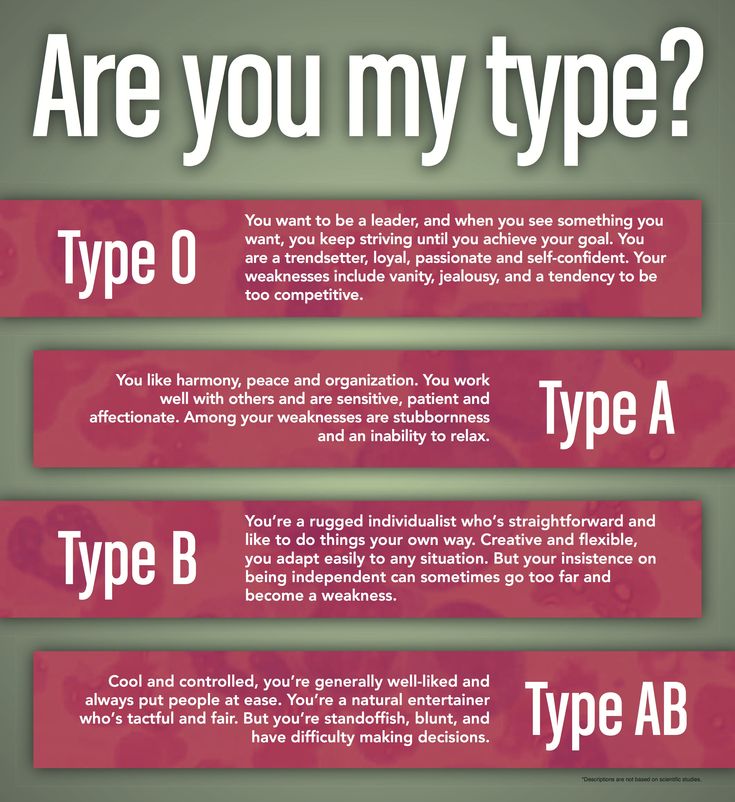
-
O × O: Though their honest attitudes can build a frank and open relationship, they tend to collide with each other when it comes to competition.
-
O × B: Type O is patient and they can enjoy and support Type B's free wheeling personality. A good pairing!
-
O × AB: Type O are straightforward and honest, so they may have a hard time understanding AB's complexity at first. But, Type O is resilient and can be supportive, especially when Type AB is facing adversity.
-
B × B: This can be the best combination when their preferences and pace fit one another. But if they don't, this pairing could be the worst.
-
B × AB: Type B likes to take time to do things and Type AB values privacy. These two naturally respect each other's wishes. They'll have a good relationship as long as they don't get in each other's way.
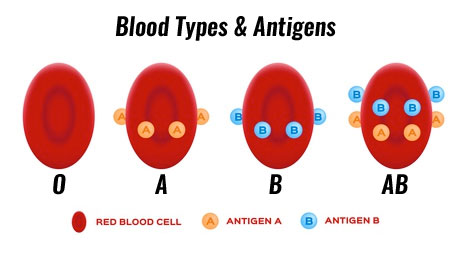
-
AB × AB: Type AB is pretty rare, so two ABs find a strong connection and affection for each other. They can understand the other's complex and unique personality more than anyone else, so the relationship can get intense.
Marriage Success by Blood Type
Blood type relationship pairings don't have to be romantic. But when they are, boy oh boy, watch out! A marriage consultancy agency in Tokyo called Celebrity gathered statistics of successful blood type marriages based on their database of professional matches. They reveal the matches that are the most likely to result in marriage:
- O Male × A Female
- A Male × A Female
- O Male × B Female
- O Male × O Female
Do you know any couples who fit these pairs? If so, you might get a wedding invite pretty soon. For more details, check out their page about personalities and tendencies for each blood type.
Blood Type Personality Theory as a Cultural Movement
There's a whole heap of books, movies, dating services, resources, and chocolate that revolve around this obsession with blood types.
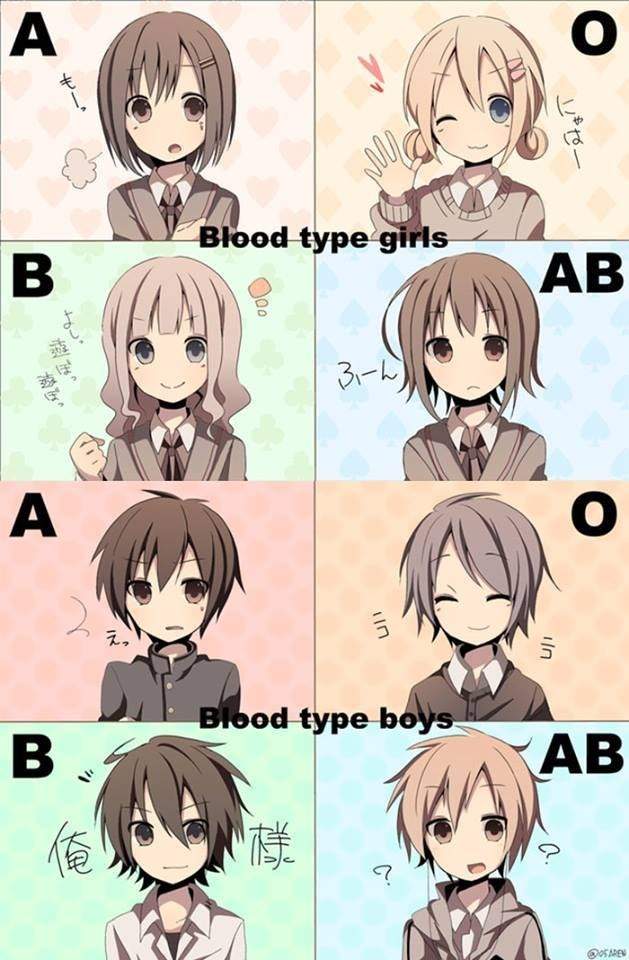
As a modern nation rooted in science and technology, you might expect old-fashioned, non-scientific beliefs about blood types to get left behind in Japan. Well, you'd be wrong. Japanese people, especially women, talk about blood type personality theory quite a bit in their daily lives, and it's one of the most common topics at goukon, nomikai, and other social gatherings. Some people are so fanatical that they won't date anyone they're incompatible with blood-wise.
And that's just scratching the surface. There's a whole heap of books, movies, dating services, resources, and chocolate that revolve around this obsession with blood types.
Blood Type Books
Source: cookieeeee18Many people love to read, so naturally there are a lot of blood-type-related books. One of the most popular is the Your Blood Type Manual Series 血液型 自分の 説明書シリーズ , which calls itself, "instruction manuals for yourself based on your blood type.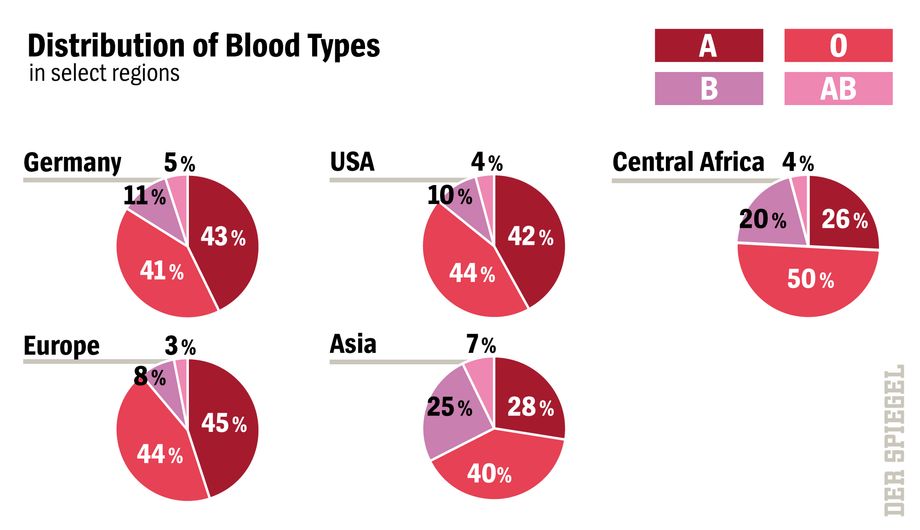 " These books introduce a bunch of physiological and behavioral characteristics of blood types explained with a hand drawn art style. The series was a huge success, and total sales of the series reached nearly 620 million copies. It's so popular that there are even accompanying mobile apps and DVDs.
" These books introduce a bunch of physiological and behavioral characteristics of blood types explained with a hand drawn art style. The series was a huge success, and total sales of the series reached nearly 620 million copies. It's so popular that there are even accompanying mobile apps and DVDs.
But why stop at relationships? Why not let your blood dictate your meals, too? Blood Type Diet: Blood Types Have They're Own Diet 血液型ダイエット: 血液型によって 合う・ 合わない 食べ物がある! is a series of books that recommends specific meal plans based on your blood type. The author, Fumiyasu Nakashima, is a chiropractor and author of many health-related books and articles. His blood type diet theory stretches back through history and ties each blood type to specific groups of prehistoric people.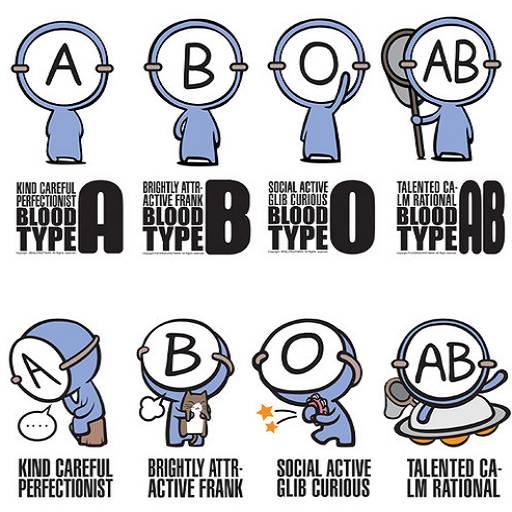 For example, blood type A is linked with agricultural people, so their ideal diet is mainly vegetables and rice.
For example, blood type A is linked with agricultural people, so their ideal diet is mainly vegetables and rice.
Blood Type Movies
There are also blood-type-themed movies, shows, and anime. Blood types help to emphasize the characters' personalities. Plus there's a lot of romance tied in with blood types, so that works perfectly in stories.
How Women Get Married Based on Their Blood Type 血液型 別 オンナが 結婚する 方法♪ is a special romance series of four episodes featuring four women with different blood types — one for each type. It was broadcasted from Feb 23 - 26, 2009 on Fuji TV.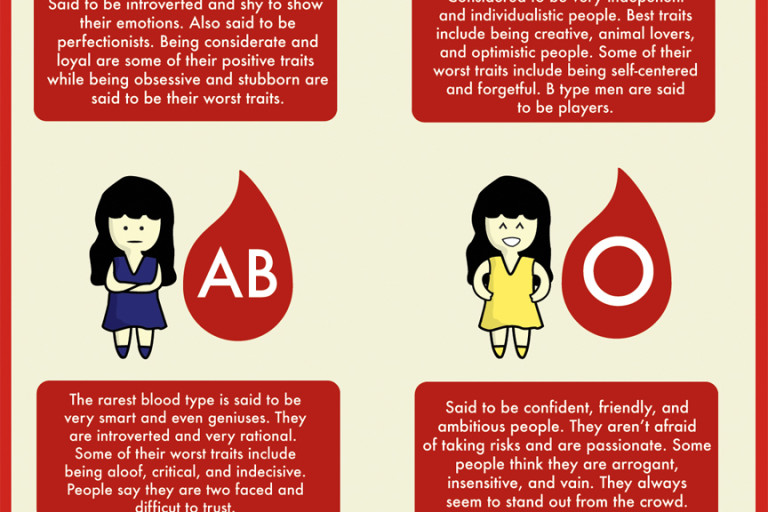
Ketsuekigata Kun 血液型くん! is a short anime based on a comic written by "Real Crazy Man." The story follows eight characters, male and female for each blood type, all voiced by actors with the corresponding gender and blood type. Every episode features a certain topic, like love, careers, or day-to-day life, showing the different ways each blood type reacts to specific situations.
Blood Type Dating Services
Many Japanese dating sites encourage you to show your blood type on your profile, so it makes perfect sense that there would be dating services that revolve specifically around that concept.
Exciting! Blood Type Goukon わくわく 血液型 合コン is a dating party service that groups men and women based on their blood. The site has a lot of testimonials from satisfied participants who were successfully matched with partners based on blood.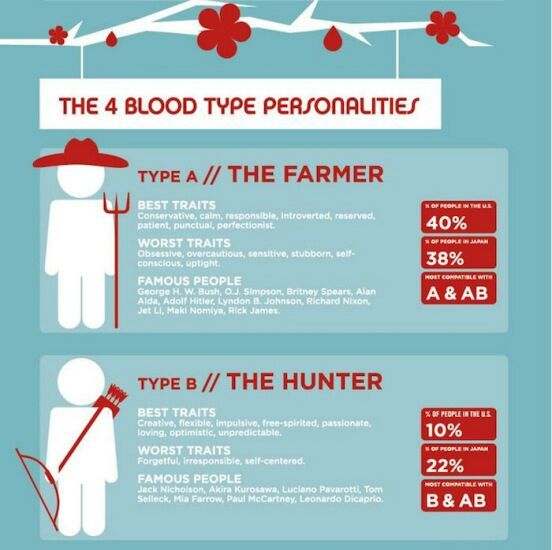
Blood Type Personality Assessment: Atarimasse 血液型 性格判断アタリマッセ is a website that explains each blood type and gives love advice based on the blood of you and your partner. If you're having relationship trouble, go get a blood test and then check out this site.
Other Blood Type Products
It doesn't stop there. There are tons of different blood type products in Japan.
ABOBA is a series of blood type condoms. You pick the condom based on your partner's blood type, which helps… you know, blood. This product also includes brief relationship advice based on your blood pairing.
Japanese toy brand, BANDAI, makes blood type chocolate 血液型 別 オモイアタルくんチョコ!, which comes with a little mascot representing a specific blood type. The package is covered in humorous words that make jokes about blood type personalities.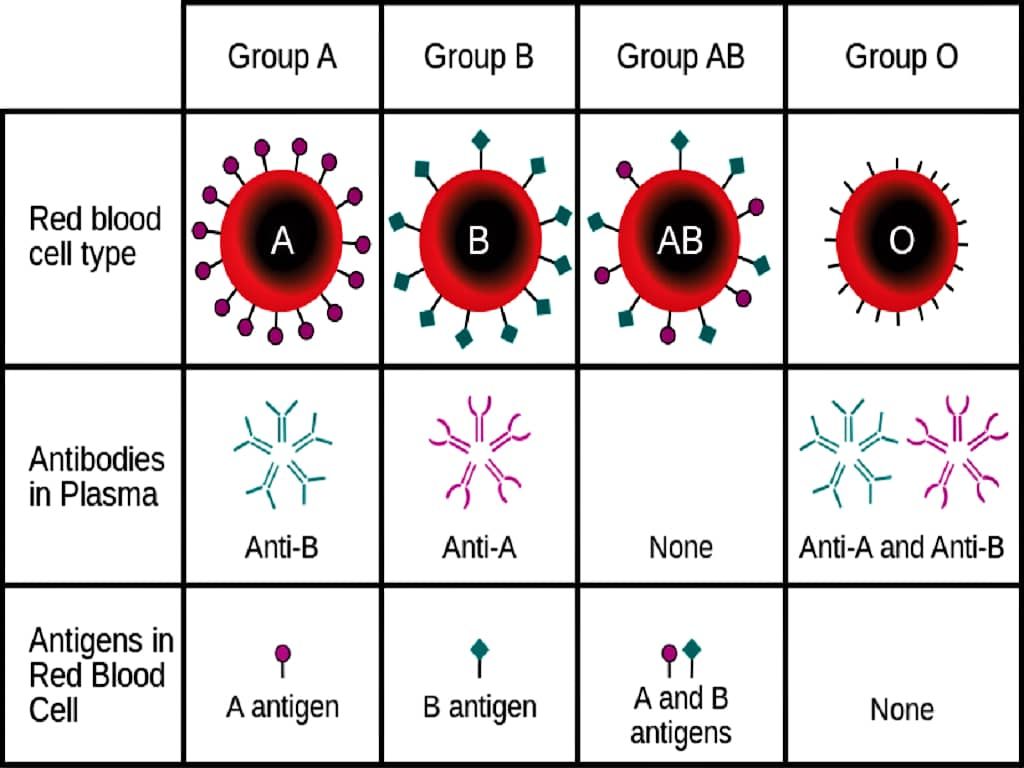 There are 10 variations for each blood type.
There are 10 variations for each blood type.
akiba:F 献血ルーム is the coolest (i.e. nerdiest) blood donation center, located in Akihabara. Non-Japanese people can donate blood too, but the service is only offered in Japanese and there are some restrictions for foreigners, so be advised. You'll get to know your blood type, while experiencing the Akiba subculture. There's also free wi-fi, manga, magazines, snacks, and drinks to enjoy while you wait. Get your nerd blood tested, you nerd.
History of the Blood Type Personality Theory in Japan
So where did this blood type obsession come from? And why does it have such a strong hold in Japan? The answer: someone made some casual observations.
In 1927, Psychologist Takeji Furukawa was a teacher at a girls' school attached to a university. He began to question the school's entrance exam system, which was based solely on academic ability. He wanted a system that also considered the applicants' personalities.
Based on this idea, he observed 11 people in his family and noted their blood types. There weren't any AB types in his family, so he lumped them together with A. And voila! From this incredibly tiny focus group, he wrote his famous thesis titled, "The Study of Temperament Through Blood Type." Even though Furukawa's theories were denied by academics in 1933, the theory was too popular to shoot down completely.
After WWII, discussions about the blood typing theory died down for some time. But in the 1970s, a journalist by the name of Masahiko Nomi, who was influenced by Takeji Furukawa, published a book about the relationships between blood types and personalities. This book became a bestseller and helped spread the theory more widely. By the 1980s, the topic was popping up in media like music, TV shows, and magazines. Furukawa's blood type theory had finally hit the big time!
Furukawa observed 11 people in his family and noted their blood types. There weren't any AB types in his family, so he lumped them together with A.
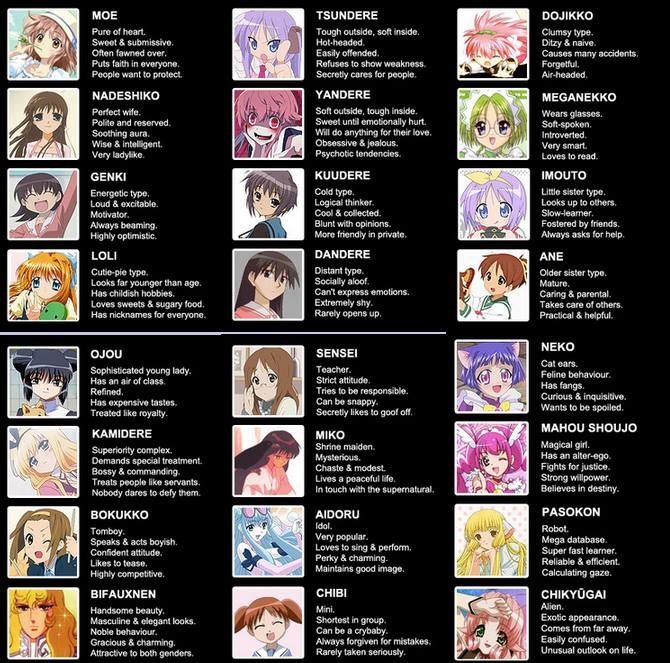
The trend slowed to a crawl in the 2000s because of anti-blood type movements (more on that later). So even though people's personal thoughts about blood type personalities are still fairly strong, there's not as much media about it as there used to be.
It's clear that this series of events created a lot (a lot!) of fanatical believers in the blood type theory in Japan. But, as I've mentioned, there is no scientific evidence to support any of it. So, why do people still believe in this stuff? From a psychological standpoint, this blood type theory has always been a controversial topic. There have been attempts to figure out the statistical relationship between blood types and personalities, but so far nothing's been proven. There has been a lot of research on the social phenomenon itself, with much of it concluding that confirmation bias is the main reason behind people's beliefs.
It's clear that these blood type theories are not real or based on any science. However, there are times I personally still feel like they are true, especially when I meet people whose personalities fit their blood types so well. But that is most likely just my confirmation bias taking over.
However, there are times I personally still feel like they are true, especially when I meet people whose personalities fit their blood types so well. But that is most likely just my confirmation bias taking over.
The blood type theory isn't all romance and fun times. It also caused a huge social problem known as burahara ブラハラ, short for "blood harassment." The blood type chart from earlier looks well-balanced, right? Each type has its own set of strengths and weaknesses. But in the real world some features get a lot of attention while others are totally ignored.
Actually, I've experienced and witnessed burahara in my life quite a bit. My blood type is B, the most disadvantaged type in Japan. B types are considered to be selfish and uncooperative. We're also thought of as creative and passionate, but generally, those good traits are overshadowed by the more negative ones. When I tell people I'm B, they ignore the good traits and start making fun of me, saying things like:
- あーそうだよね!わかるわかる!めっちゃBっぽいもん。
- Oh, I knew it! I can tell you're B, because you're so B-ish.

The implication here is, "Oh, of course you're B! You're selfish and uncooperative, now that I think about it."
It's believed that this discrimination comes from the population ratio.
- A = 40%
- O = 30%
- B = 20%
- AB = 10%
One of the biggest advocates of Japan's blood type personality theory is TV shows. So in recent years, these shows have been receiving more and more complaints.
B is in the minority and, as is the case in a lot of situations, people in the minority are put at a disadvantage. Though there are fewer AB than B, in my personal experience, B types are bullied more often than AB, because AB is so rare (at only 10%). People haven't run into enough AB types to know if they really fit the stereotype.
The second most common blood type (O) gets harassed, as well. I've often heard people asking if someone is O, when they do something forceful or rough, like tear open a bag of candy. I've rarely seen situations where A, the most common blood type in Japan, gets picked on for things, but it does happen. For example, if you say things like, "You're not very A-like," it can be interpreted as, "You're not organized enough to be A," putting them down for not meeting the positive expectations placed on them.
I've rarely seen situations where A, the most common blood type in Japan, gets picked on for things, but it does happen. For example, if you say things like, "You're not very A-like," it can be interpreted as, "You're not organized enough to be A," putting them down for not meeting the positive expectations placed on them.
Anti-Blood Type Bullying Movements
It's not all blood type bullying though. Minority blood types (like B) are starting to push back.
One of the biggest advocates of Japan's blood type personality theory is TV shows. So in recent years, these shows have been receiving more and more complaints. In 2004, the Broadcasting Ethics & Program Improvement Organization sent requests to television shows, asking that they stop encouraging people to believe personalities are influenced by blood types.. This helped reduce broadcasts about blood type theories quite a bit. And this is why there are fewer programs talking about blood types than there were 10 years ago.
Unfortunately, burahara can be an issue in your career, too. Blood types have been used as criteria for job recruitment and school entrance exams. Though companies have been warned by the government to omit questions about blood types in job applications, the problem might still affect you, if your would-be boss is a big believer in blood stereotyping. If you get a chance to interview for a Japanese company or have a Japanese boss, remember you don't have to answer those questions. You can just say that you don't know your blood type.
Japanese Blood Type Personality Theory and You
Whether or not you believe blood types affect personalities, you can still have fun with this part of Japanese culture. But don't go testing your blood just because you're about to take a trip to Japan. Try to participate when people bring up your blood type (but don't become an offensive burahara bully). And try to read the situation if you're teased about your blood type. Japanese people tend to pick on others as a sign of affection, so if they tease you about your blood type, it probably means that they want to get to know you.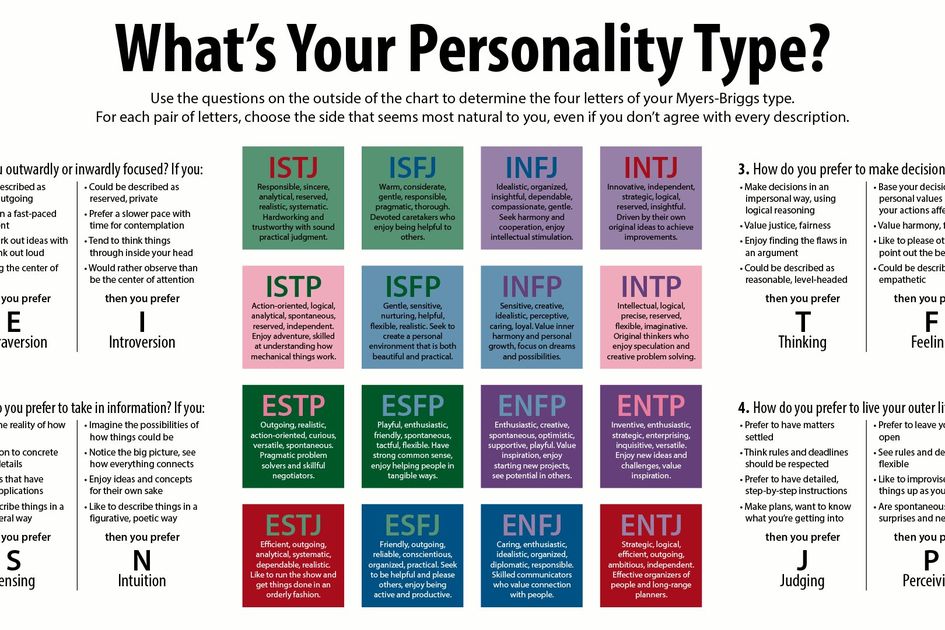 Think of the Japanese blood type personality theory as a fun way to strike up a conversation and make new Japanese friends (and nothing more).
Think of the Japanese blood type personality theory as a fun way to strike up a conversation and make new Japanese friends (and nothing more).
Sources
- 血液型性格判断アタリマッセ
- 血液型による性格分析と相性占い
- こいぴた
- 恋する.net
- Japanese Wikipedia
- Japanese Wikipedia (ABO式血液型)
- Japanese Wikipedia (古川竹二)
- Japanese Wikipedia (能見正比古)
- Nifty News
Japanese Blood Type Personality Theory And You
Do you know what blood type you are? What about the blood type of everyone in your family?
I do, and I even know the blood type, or ketsuekigata 血液型, of all my friends, too. And I'm not alone. According to a 2016 survey of 3,355 Japanese people, 99% knew their blood type.
Wow! But why all the blood knowledge?
- 血液型(けつえきがた)
- blood type
In Japan, blood types are considered an important indicator of a person's personality. It's known as the "Japanese Blood Type Personality Theory.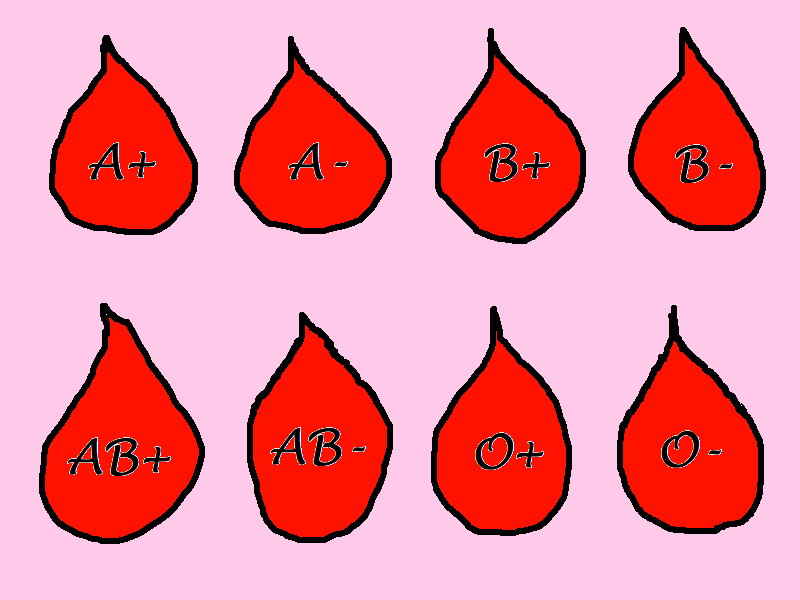 " Though this may seem far-fetched, a lot of people believe in it. In fact, the aforementioned survey shows 29% of males and 45% of females believe.
" Though this may seem far-fetched, a lot of people believe in it. In fact, the aforementioned survey shows 29% of males and 45% of females believe.
If you're planning on visiting Japan or interacting with Japanese people, read on. Understanding Japan's obsession with blood types can help you make new friends and fit in with Japanese groups. Plus, you'll find out where these beliefs came from and why it has such a hold on the Japanese consciousness.
- Japanese Blood Type Personality Theory
- Blood Type A
- Blood Type O
- Blood Type B
- Blood Type AB
- Blood Type Personality Compatibility
- Marriage Success by Blood Type
- Blood Type Personality Theory as a Cultural Movement
- Blood Type Books
- Blood Type Movies
- Blood Type Dating Services
- Other Blood Type Products
- History of the Blood Type Personality Theory in Japan
-
- Anti-Blood Type Bullying Movements
- Japanese Blood Type Personality Theory and You
Japanese Blood Type Personality Theory
Japan's interest in blood types comes from the idea that a person's blood helps define their personality.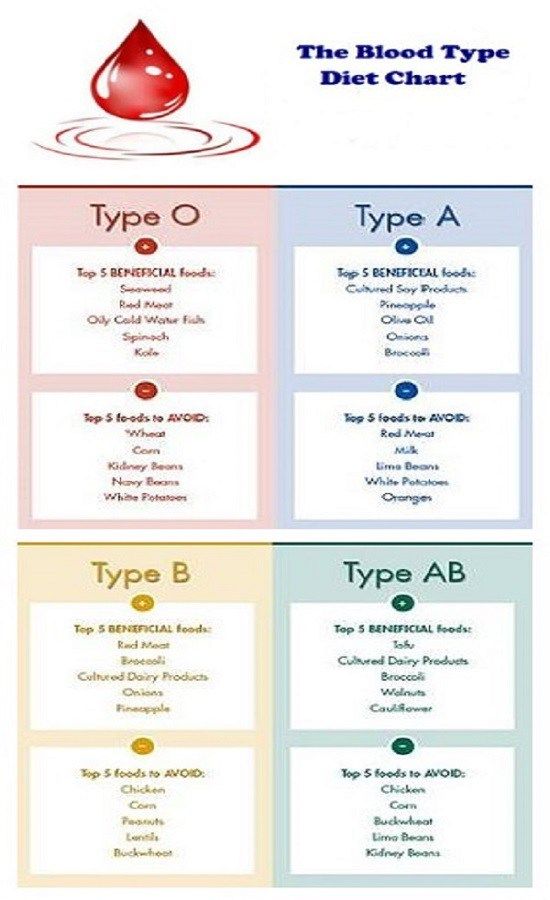 There are personality traits for each blood type. When someone acts a certain way, Japanese people like to tease, saying, "Of course you'd do that, you're B," and so on. It facilitates communication and helps people feel more open with one another.
There are personality traits for each blood type. When someone acts a certain way, Japanese people like to tease, saying, "Of course you'd do that, you're B," and so on. It facilitates communication and helps people feel more open with one another.
Blood types also help Japanese people decide if they're good match, romantically or otherwise. Certain blood types pair well and promote better relationships, or so the thinking goes.
So when a Japanese person asks:
- 血液型、 何 型?
- What blood type are you?
Don't freak out! No one is asking you to donate blood. The question merely expresses curiosity about you as a person. If you've ever been asked, "What's your sign?" in English, it's the same idea.
Now for the fun stuff! Want to find out if your personality matches your blood type? Take a look at the chart below to find out. And don't worry if you're positive or negative. That matters in medical situations, but doesn't affect you here.
And don't worry if you're positive or negative. That matters in medical situations, but doesn't affect you here.
| Blood Type | Ratio in Japan | Positive Traits | Negative Traits |
|---|---|---|---|
| A | 40% | Earnest, Neat | Stubborn, Anxious |
| O | 30% | Easygoing, Leadership Ability | Insensitive, Unpunctual |
| B | 20% | Passionate, Creative | Selfish, Uncooperative |
| AB | 10% | Talented, Composed | Eccentric, Two-faced |
To get a clearer idea of how these blood type personalities play out, here's a picture from Twitter that demonstrates it well.
“@gdgdtoday: 血液型の違う家族がみかんの皮を剥いたところこうなりました。クスッとして思わず共感した方、そっとRTで教えて下さると嬉しいです(笑) http://t.
— れぃれぃ(締切10月末は死が見えますね) (@leilei010101) December 13, 2012co/DurVlocV”
違い過ぎ素敵w
Mikan were peeled by four family members with different blood types
- Mom, A: peeled the orange cleanly.
- The picture poster, AB: peeled artistic shapes.
- Dad, B: peeled roughly and wrapped it around a used tissue.
- Younger brother, O: broke the peel into small pieces and made a mess.
This is just the tip of the iceberg though. Let's dive deep into these giant pools of blood. If you know your blood type, try and see how well these descriptions match you.
Blood Type A
Most of the Japanese population is type A. People with this blood type are described primarily as kichōmen 几帳面, or well-organized. They like to keep things neat but can be stubborn and get stressed out easily.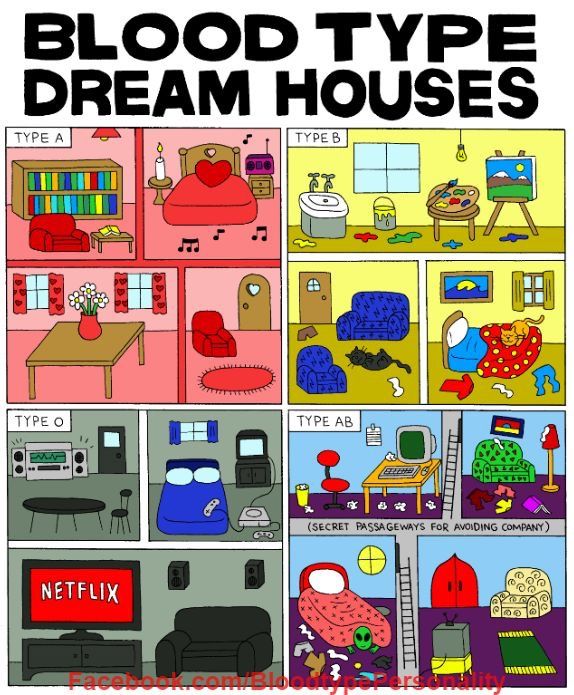 They also value harmony with others. Agricultural people are the root of blood type A, and it's been said working collaboratively on farms developed these blood type personality traits.
They also value harmony with others. Agricultural people are the root of blood type A, and it's been said working collaboratively on farms developed these blood type personality traits.
- 几帳面(きちょうめん)
- well-organized
| Timid | Mild-mannered | Anxious | Earnest |
| Sensitive | Stubborn | Intense | Reserved |
| Patient | Responsible | Fastidious | Tense |
| Tactful | Shy | Withdrawn | Polite |
| Perfectionist | Stressed | Conscientious | Wary |
| Kind | Diligent | Attentive | Composed |
| Reliable | Nervous | Neat |
Blood Type O
Blood type O is often described as rakkanshugi 楽観主義, or optimistic.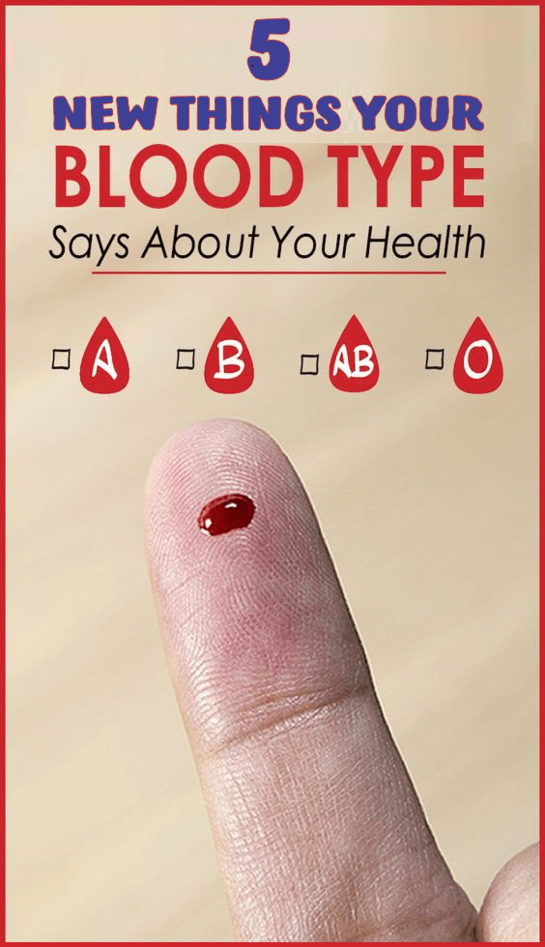 They are outgoing, have leadership abilities, and are able to set the mood for groups of people. They don't care much about little things (as you can see from the mikan picture above), so their behavior sometimes freaks out more sensitive A types. Though they're often late to events (and sometimes rude), O types are incredibly resilient and flexible, enabling them to roll with the punches.
They are outgoing, have leadership abilities, and are able to set the mood for groups of people. They don't care much about little things (as you can see from the mikan picture above), so their behavior sometimes freaks out more sensitive A types. Though they're often late to events (and sometimes rude), O types are incredibly resilient and flexible, enabling them to roll with the punches.
- 楽観主義(らっかんしゅぎ)
- optimistic
| Optimistic | Easygoing | Leadership Ability | Insensitive |
| Unpunctual | Calm | Confident | Self-determined |
| Strong-willed | Intuitive | Self-centered | Cold |
| Unpredictable | Workaholic | Outgoing | Energetic |
| Social | Flexible | Realistic | Financially-minded |
| Resilient | Romanticist | Cautious | Devoted |
| Peaceful | Carefree | Impressionable | Insecure |
| Emotional | Ambitious | Trendsetter | Independent |
| Loyal | Athletic | Robust | Passionate |
| Agreeable | Arrogant | Vain | Jealous |
| Ruthless | Rude | Imitator |
Blood Type B
Blood type B is generally described as jikochū 自己中, or selfish. They are also known for their creativity. Blood type B has a strong sense of curiosity, but at the same time, loses interest easily. Though there are a lot of positives to B types, people tend to focus on the negatives for reasons we'll get into later. Some say their root is in nomadic peoples who roamed from place to place.
They are also known for their creativity. Blood type B has a strong sense of curiosity, but at the same time, loses interest easily. Though there are a lot of positives to B types, people tend to focus on the negatives for reasons we'll get into later. Some say their root is in nomadic peoples who roamed from place to place.
- 自己中 (じこちゅう)
- selfish
| Selfish | Passionate | Erratic | Wild |
| Active | Uncooperative | Creative | Strong |
| Irresponsible | Unforgiving | Relaxed | Freewheeling |
| Unconventional | Unpretentious | Pragmatist | Flexible |
| Curious | Cheerful | Outgoing | Adventurous |
| Indecisive | Unpredictable |
Blood Type AB
Blood type AB is a hybrid of A and B, two different personalities mixed together. They are often seen as dual-natured and complicated. For example, they are shy like A types, but also are outgoing like type B. Blood type AB is the rarest in Japan (and many other places in the world, too), so they are hard to find. This reinforces the stereotype that AB people are kawarimono 変わり者, or eccentric.
They are often seen as dual-natured and complicated. For example, they are shy like A types, but also are outgoing like type B. Blood type AB is the rarest in Japan (and many other places in the world, too), so they are hard to find. This reinforces the stereotype that AB people are kawarimono 変わり者, or eccentric.
- 変わり者(かわりもの)
- eccentric
| Talented | Composed | Rational | Artistic |
| Aloof | Cool | Two-faced | Controlled |
| Sociable | Critical | Indecisive | Forgetful |
| Irresponsible | Shy | Outgoing | Trustworthy |
| Self-centered | Sensitive | Dream Chaser | Spiritual |
| Calm | Mysterious | Vulnerable | Complicated |
| Private | Creative | Eccentric | Charming |
| Impatient | Proud | Diplomatic | Discriminating |
| Popular | Adaptable |
Blood Type Personality Compatibility
You might be wondering which blood types get along with each other.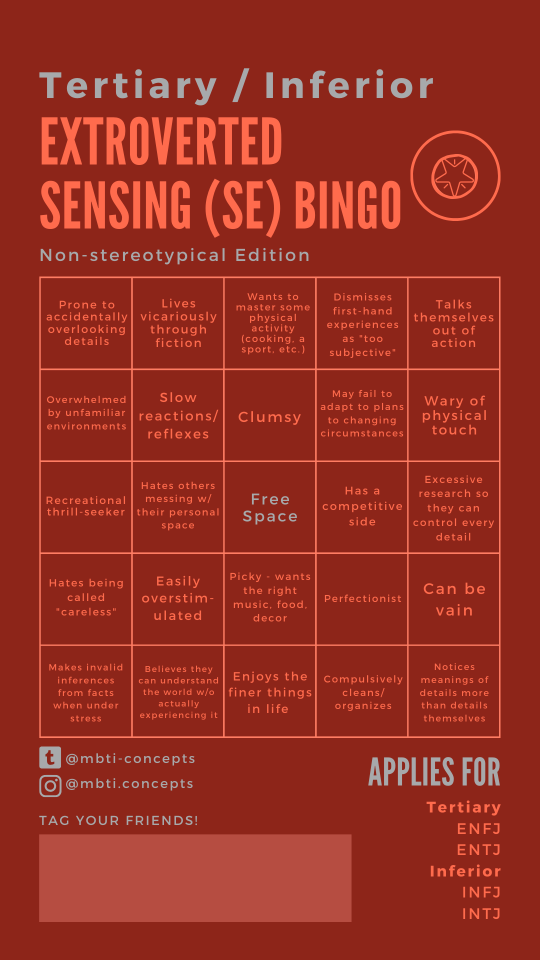 Compatibility can differ depending on how the stereotypes are interpreted, so let's dig into how relationships work in the Japanese blood type personality theory.
Compatibility can differ depending on how the stereotypes are interpreted, so let's dig into how relationships work in the Japanese blood type personality theory.
-
A × A: These similar personalities generate empathy and affection, but sometimes create irritation because both people are so intense.
-
A × O: Type A and Type O have very different personalities (A is sensitive, but O is not). They cover each other's weaknesses, but the differences may stress them out.
-
A × B: Type A envies Type B's ability to enjoy things at their own pace. Type B is uncomfortable with A's doting. The kindness feels intrusive.
-
A × AB: This combination depends on the individuals. AB is part A and part B. Type A wouldn't get along with an AB who is too strong on the B side (meaning they're self-centered). However, they can build a stable relationship, if the person is an A-ish AB.
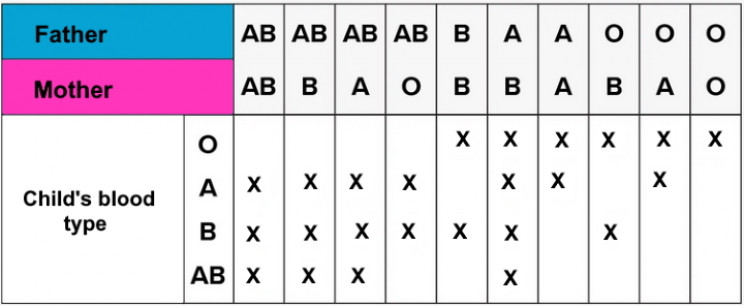
-
O × O: Though their honest attitudes can build a frank and open relationship, they tend to collide with each other when it comes to competition.
-
O × B: Type O is patient and they can enjoy and support Type B's free wheeling personality. A good pairing!
-
O × AB: Type O are straightforward and honest, so they may have a hard time understanding AB's complexity at first. But, Type O is resilient and can be supportive, especially when Type AB is facing adversity.
-
B × B: This can be the best combination when their preferences and pace fit one another. But if they don't, this pairing could be the worst.
-
B × AB: Type B likes to take time to do things and Type AB values privacy. These two naturally respect each other's wishes. They'll have a good relationship as long as they don't get in each other's way.

-
AB × AB: Type AB is pretty rare, so two ABs find a strong connection and affection for each other. They can understand the other's complex and unique personality more than anyone else, so the relationship can get intense.
Marriage Success by Blood Type
Blood type relationship pairings don't have to be romantic. But when they are, boy oh boy, watch out! A marriage consultancy agency in Tokyo called Celebrity gathered statistics of successful blood type marriages based on their database of professional matches. They reveal the matches that are the most likely to result in marriage:
- O Male × A Female
- A Male × A Female
- O Male × B Female
- O Male × O Female
Do you know any couples who fit these pairs? If so, you might get a wedding invite pretty soon. For more details, check out their page about personalities and tendencies for each blood type.
Blood Type Personality Theory as a Cultural Movement
There's a whole heap of books, movies, dating services, resources, and chocolate that revolve around this obsession with blood types.

As a modern nation rooted in science and technology, you might expect old-fashioned, non-scientific beliefs about blood types to get left behind in Japan. Well, you'd be wrong. Japanese people, especially women, talk about blood type personality theory quite a bit in their daily lives, and it's one of the most common topics at goukon, nomikai, and other social gatherings. Some people are so fanatical that they won't date anyone they're incompatible with blood-wise.
And that's just scratching the surface. There's a whole heap of books, movies, dating services, resources, and chocolate that revolve around this obsession with blood types.
Blood Type Books
Source: cookieeeee18Many people love to read, so naturally there are a lot of blood-type-related books. One of the most popular is the Your Blood Type Manual Series 血液型 自分の 説明書シリーズ , which calls itself, "instruction manuals for yourself based on your blood type.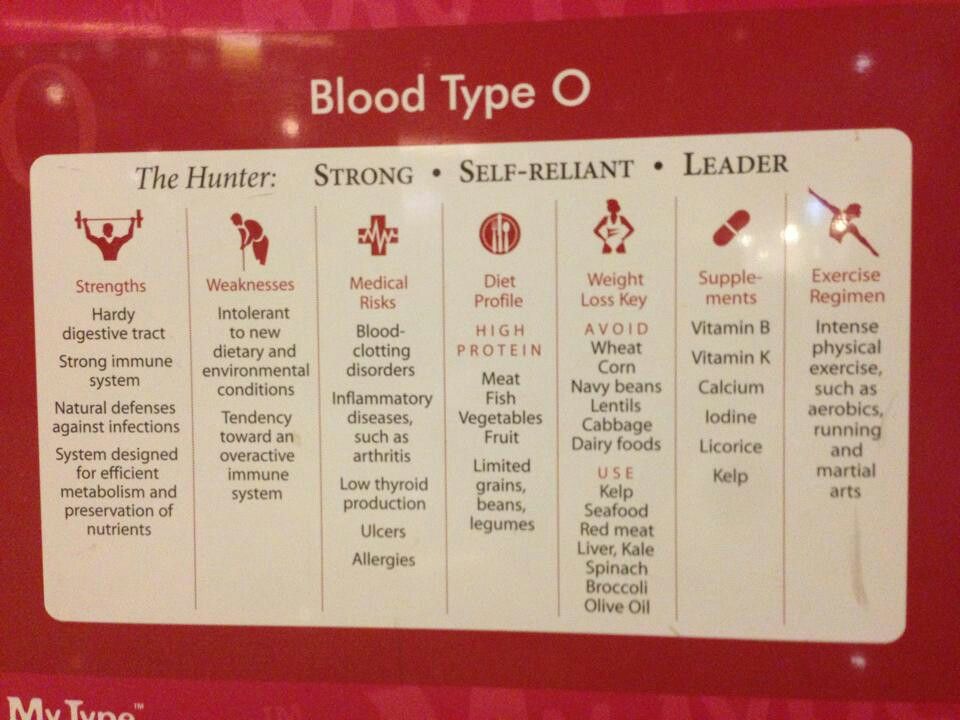 " These books introduce a bunch of physiological and behavioral characteristics of blood types explained with a hand drawn art style. The series was a huge success, and total sales of the series reached nearly 620 million copies. It's so popular that there are even accompanying mobile apps and DVDs.
" These books introduce a bunch of physiological and behavioral characteristics of blood types explained with a hand drawn art style. The series was a huge success, and total sales of the series reached nearly 620 million copies. It's so popular that there are even accompanying mobile apps and DVDs.
But why stop at relationships? Why not let your blood dictate your meals, too? Blood Type Diet: Blood Types Have They're Own Diet 血液型ダイエット: 血液型によって 合う・ 合わない 食べ物がある! is a series of books that recommends specific meal plans based on your blood type. The author, Fumiyasu Nakashima, is a chiropractor and author of many health-related books and articles. His blood type diet theory stretches back through history and ties each blood type to specific groups of prehistoric people.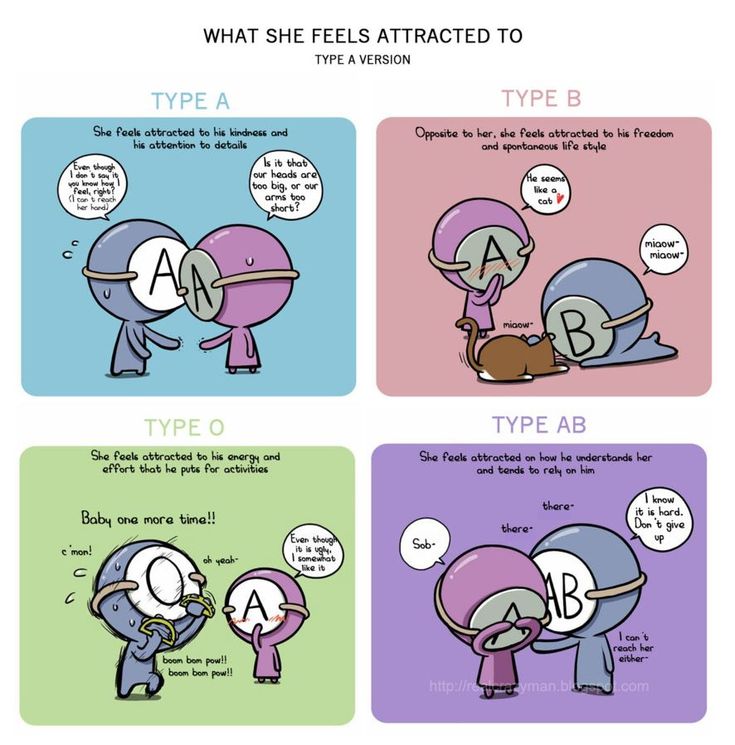 For example, blood type A is linked with agricultural people, so their ideal diet is mainly vegetables and rice.
For example, blood type A is linked with agricultural people, so their ideal diet is mainly vegetables and rice.
Blood Type Movies
There are also blood-type-themed movies, shows, and anime. Blood types help to emphasize the characters' personalities. Plus there's a lot of romance tied in with blood types, so that works perfectly in stories.
How Women Get Married Based on Their Blood Type 血液型 別 オンナが 結婚する 方法♪ is a special romance series of four episodes featuring four women with different blood types — one for each type. It was broadcasted from Feb 23 - 26, 2009 on Fuji TV.
Ketsuekigata Kun 血液型くん! is a short anime based on a comic written by "Real Crazy Man." The story follows eight characters, male and female for each blood type, all voiced by actors with the corresponding gender and blood type. Every episode features a certain topic, like love, careers, or day-to-day life, showing the different ways each blood type reacts to specific situations.
Blood Type Dating Services
Many Japanese dating sites encourage you to show your blood type on your profile, so it makes perfect sense that there would be dating services that revolve specifically around that concept.
Exciting! Blood Type Goukon わくわく 血液型 合コン is a dating party service that groups men and women based on their blood. The site has a lot of testimonials from satisfied participants who were successfully matched with partners based on blood.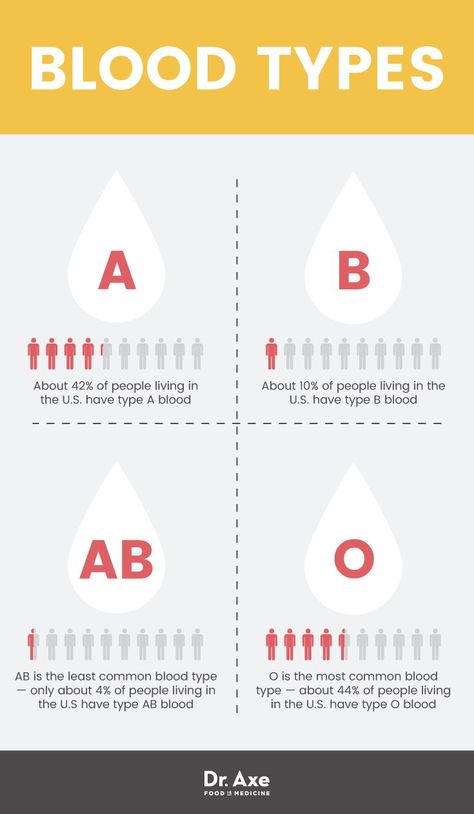
Blood Type Personality Assessment: Atarimasse 血液型 性格判断アタリマッセ is a website that explains each blood type and gives love advice based on the blood of you and your partner. If you're having relationship trouble, go get a blood test and then check out this site.
Other Blood Type Products
It doesn't stop there. There are tons of different blood type products in Japan.
ABOBA is a series of blood type condoms. You pick the condom based on your partner's blood type, which helps… you know, blood. This product also includes brief relationship advice based on your blood pairing.
Japanese toy brand, BANDAI, makes blood type chocolate 血液型 別 オモイアタルくんチョコ!, which comes with a little mascot representing a specific blood type. The package is covered in humorous words that make jokes about blood type personalities.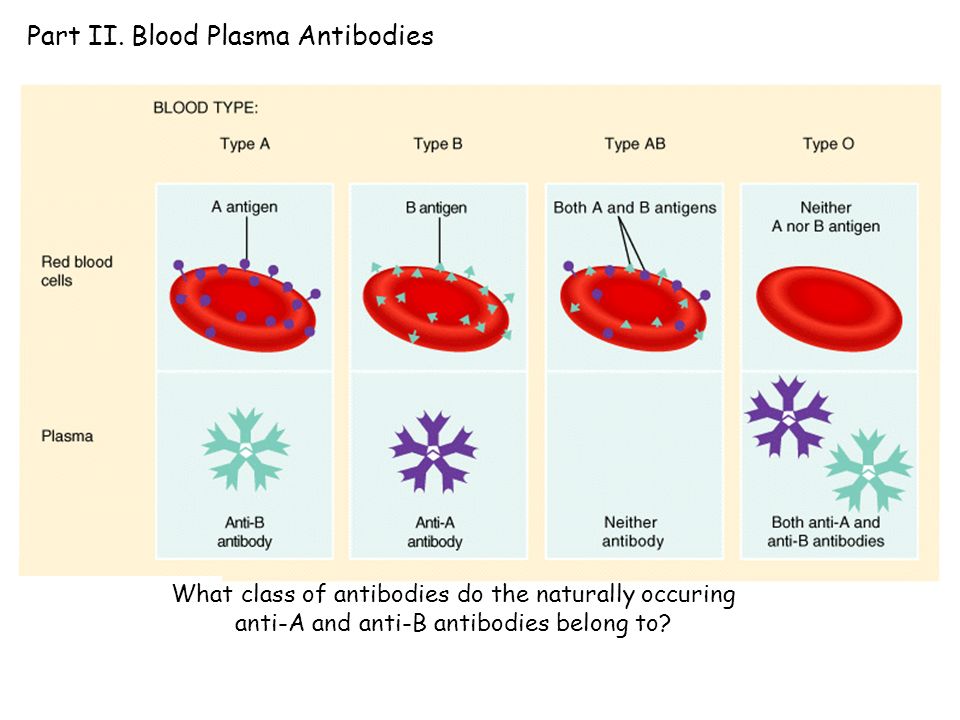 There are 10 variations for each blood type.
There are 10 variations for each blood type.
akiba:F 献血ルーム is the coolest (i.e. nerdiest) blood donation center, located in Akihabara. Non-Japanese people can donate blood too, but the service is only offered in Japanese and there are some restrictions for foreigners, so be advised. You'll get to know your blood type, while experiencing the Akiba subculture. There's also free wi-fi, manga, magazines, snacks, and drinks to enjoy while you wait. Get your nerd blood tested, you nerd.
History of the Blood Type Personality Theory in Japan
So where did this blood type obsession come from? And why does it have such a strong hold in Japan? The answer: someone made some casual observations.
In 1927, Psychologist Takeji Furukawa was a teacher at a girls' school attached to a university. He began to question the school's entrance exam system, which was based solely on academic ability. He wanted a system that also considered the applicants' personalities.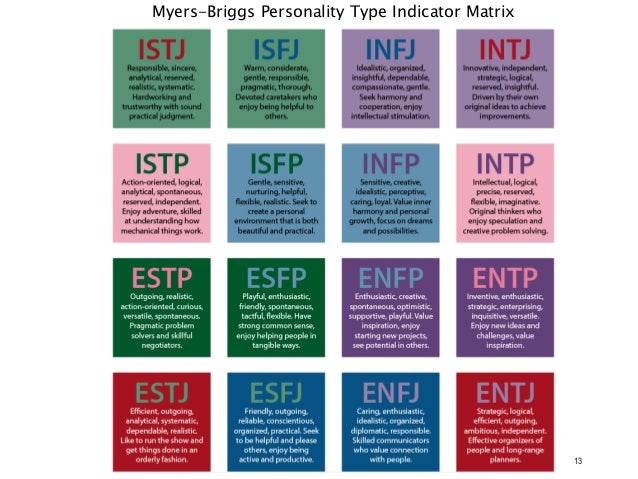
Based on this idea, he observed 11 people in his family and noted their blood types. There weren't any AB types in his family, so he lumped them together with A. And voila! From this incredibly tiny focus group, he wrote his famous thesis titled, "The Study of Temperament Through Blood Type." Even though Furukawa's theories were denied by academics in 1933, the theory was too popular to shoot down completely.
After WWII, discussions about the blood typing theory died down for some time. But in the 1970s, a journalist by the name of Masahiko Nomi, who was influenced by Takeji Furukawa, published a book about the relationships between blood types and personalities. This book became a bestseller and helped spread the theory more widely. By the 1980s, the topic was popping up in media like music, TV shows, and magazines. Furukawa's blood type theory had finally hit the big time!
Furukawa observed 11 people in his family and noted their blood types. There weren't any AB types in his family, so he lumped them together with A.
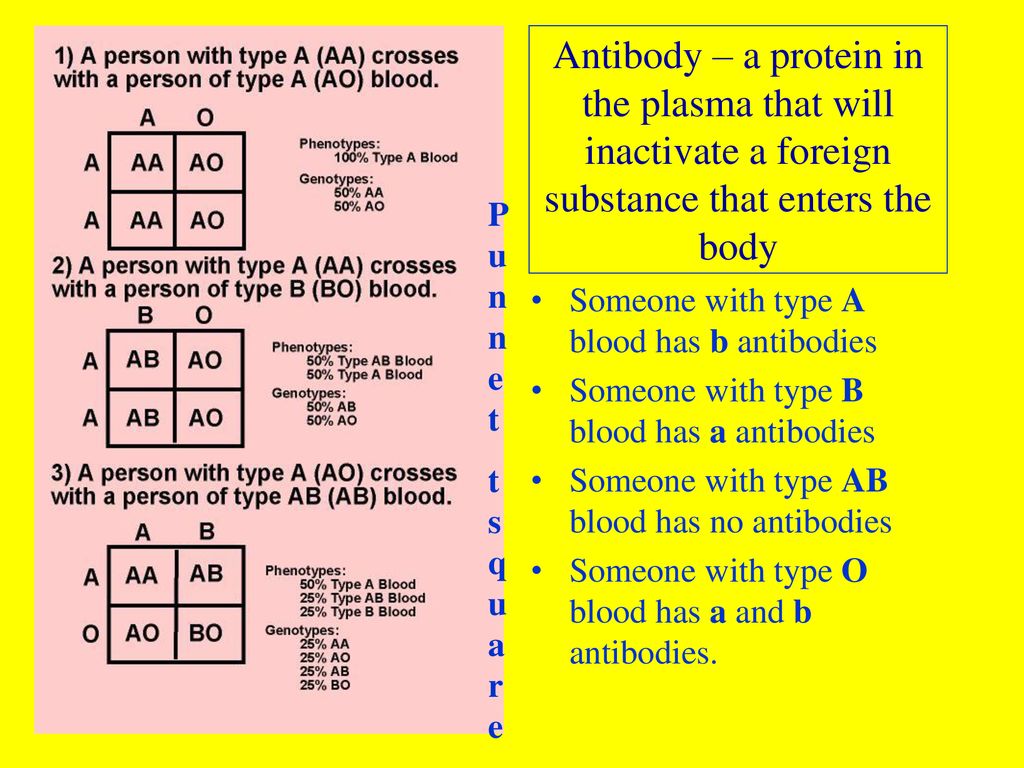
The trend slowed to a crawl in the 2000s because of anti-blood type movements (more on that later). So even though people's personal thoughts about blood type personalities are still fairly strong, there's not as much media about it as there used to be.
It's clear that this series of events created a lot (a lot!) of fanatical believers in the blood type theory in Japan. But, as I've mentioned, there is no scientific evidence to support any of it. So, why do people still believe in this stuff? From a psychological standpoint, this blood type theory has always been a controversial topic. There have been attempts to figure out the statistical relationship between blood types and personalities, but so far nothing's been proven. There has been a lot of research on the social phenomenon itself, with much of it concluding that confirmation bias is the main reason behind people's beliefs.
It's clear that these blood type theories are not real or based on any science.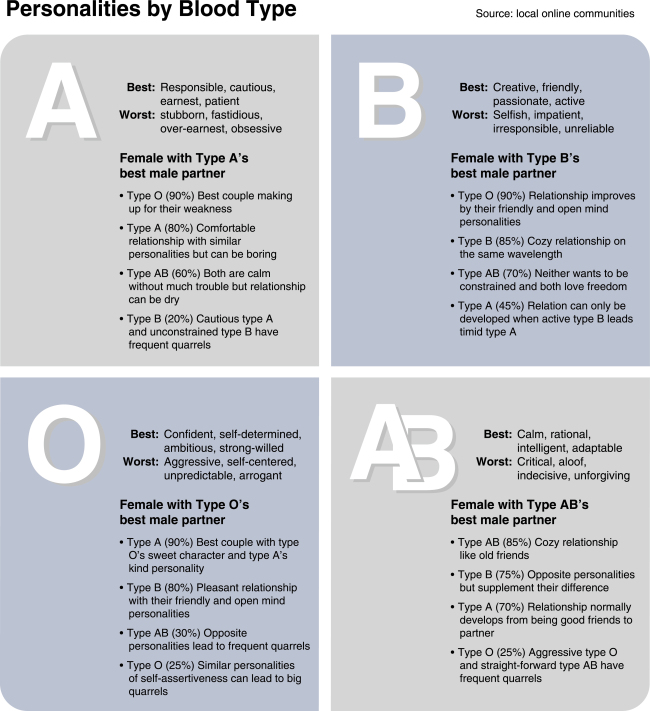 However, there are times I personally still feel like they are true, especially when I meet people whose personalities fit their blood types so well. But that is most likely just my confirmation bias taking over.
However, there are times I personally still feel like they are true, especially when I meet people whose personalities fit their blood types so well. But that is most likely just my confirmation bias taking over.
The blood type theory isn't all romance and fun times. It also caused a huge social problem known as burahara ブラハラ, short for "blood harassment." The blood type chart from earlier looks well-balanced, right? Each type has its own set of strengths and weaknesses. But in the real world some features get a lot of attention while others are totally ignored.
Actually, I've experienced and witnessed burahara in my life quite a bit. My blood type is B, the most disadvantaged type in Japan. B types are considered to be selfish and uncooperative. We're also thought of as creative and passionate, but generally, those good traits are overshadowed by the more negative ones. When I tell people I'm B, they ignore the good traits and start making fun of me, saying things like:
- あーそうだよね!わかるわかる!めっちゃBっぽいもん。
- Oh, I knew it! I can tell you're B, because you're so B-ish.
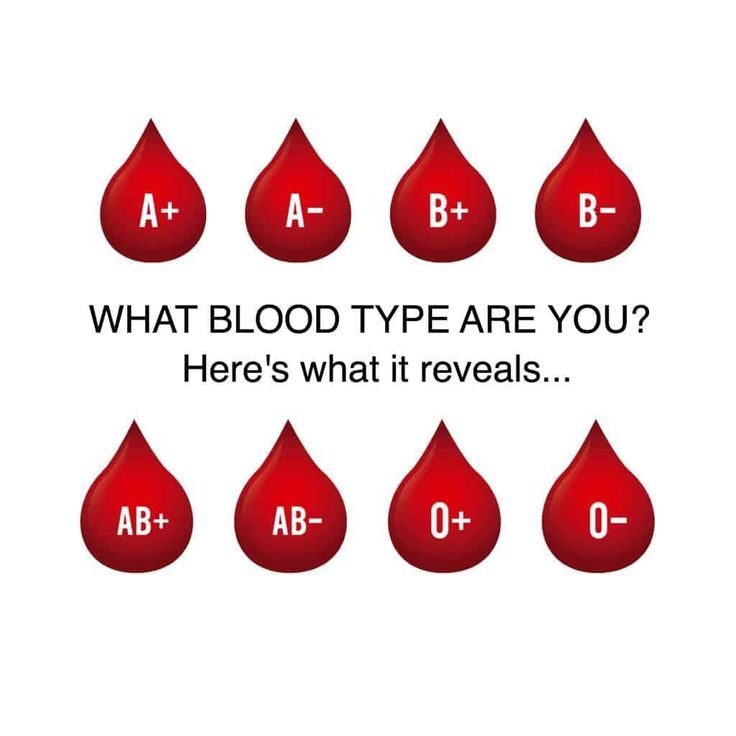
The implication here is, "Oh, of course you're B! You're selfish and uncooperative, now that I think about it."
It's believed that this discrimination comes from the population ratio.
- A = 40%
- O = 30%
- B = 20%
- AB = 10%
One of the biggest advocates of Japan's blood type personality theory is TV shows. So in recent years, these shows have been receiving more and more complaints.
B is in the minority and, as is the case in a lot of situations, people in the minority are put at a disadvantage. Though there are fewer AB than B, in my personal experience, B types are bullied more often than AB, because AB is so rare (at only 10%). People haven't run into enough AB types to know if they really fit the stereotype.
The second most common blood type (O) gets harassed, as well. I've often heard people asking if someone is O, when they do something forceful or rough, like tear open a bag of candy. I've rarely seen situations where A, the most common blood type in Japan, gets picked on for things, but it does happen. For example, if you say things like, "You're not very A-like," it can be interpreted as, "You're not organized enough to be A," putting them down for not meeting the positive expectations placed on them.
I've rarely seen situations where A, the most common blood type in Japan, gets picked on for things, but it does happen. For example, if you say things like, "You're not very A-like," it can be interpreted as, "You're not organized enough to be A," putting them down for not meeting the positive expectations placed on them.
Anti-Blood Type Bullying Movements
It's not all blood type bullying though. Minority blood types (like B) are starting to push back.
One of the biggest advocates of Japan's blood type personality theory is TV shows. So in recent years, these shows have been receiving more and more complaints. In 2004, the Broadcasting Ethics & Program Improvement Organization sent requests to television shows, asking that they stop encouraging people to believe personalities are influenced by blood types.. This helped reduce broadcasts about blood type theories quite a bit. And this is why there are fewer programs talking about blood types than there were 10 years ago.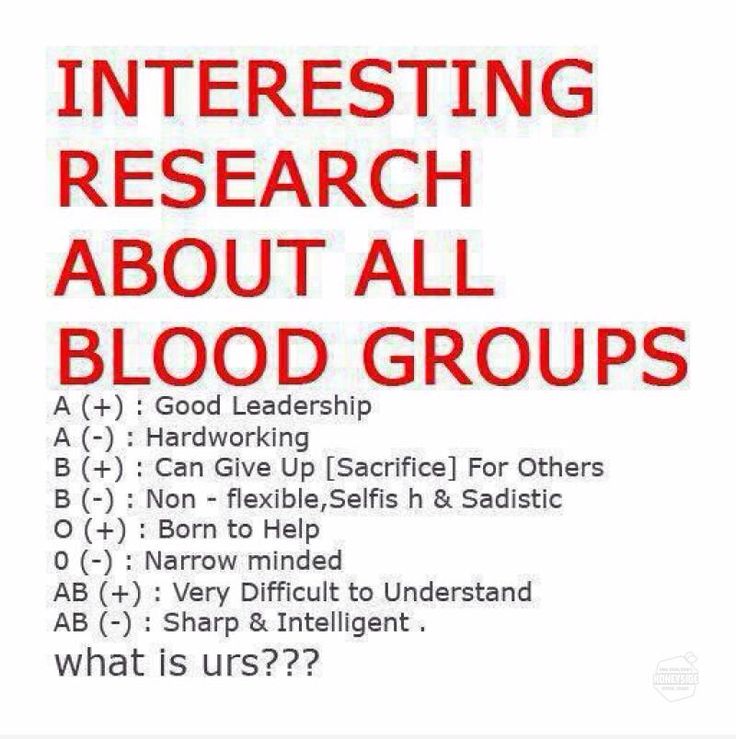
Unfortunately, burahara can be an issue in your career, too. Blood types have been used as criteria for job recruitment and school entrance exams. Though companies have been warned by the government to omit questions about blood types in job applications, the problem might still affect you, if your would-be boss is a big believer in blood stereotyping. If you get a chance to interview for a Japanese company or have a Japanese boss, remember you don't have to answer those questions. You can just say that you don't know your blood type.
Japanese Blood Type Personality Theory and You
Whether or not you believe blood types affect personalities, you can still have fun with this part of Japanese culture. But don't go testing your blood just because you're about to take a trip to Japan. Try to participate when people bring up your blood type (but don't become an offensive burahara bully). And try to read the situation if you're teased about your blood type. Japanese people tend to pick on others as a sign of affection, so if they tease you about your blood type, it probably means that they want to get to know you.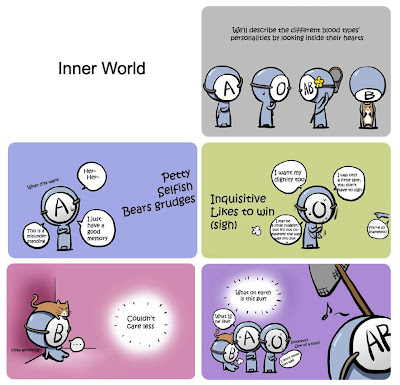 Think of the Japanese blood type personality theory as a fun way to strike up a conversation and make new Japanese friends (and nothing more).
Think of the Japanese blood type personality theory as a fun way to strike up a conversation and make new Japanese friends (and nothing more).
Sources
- 血液型性格判断アタリマッセ
- 血液型による性格分析と相性占い
- こいぴた
- 恋する.net
- Japanese Wikipedia
- Japanese Wikipedia (ABO式血液型)
- Japanese Wikipedia (古川竹二)
- Japanese Wikipedia (能見正比古)
- Nifty News
Japanese horoscope by blood type May 27, 2021
While the whole world is enthusiastically reading horoscopes in order to understand themselves and others, in Japan a person is judged by ... his blood type. It is taken into account when meeting, applying for study and work, when choosing friends and life partners. Even goods are produced according to this principle: food, drinks, perfumes, etc. are prepared for different blood types. There are also special horoscopes for different blood types, which are popular not only in Japan. So what do they say?
I blood group (0) "Hunters"
It is believed that this is the oldest blood type.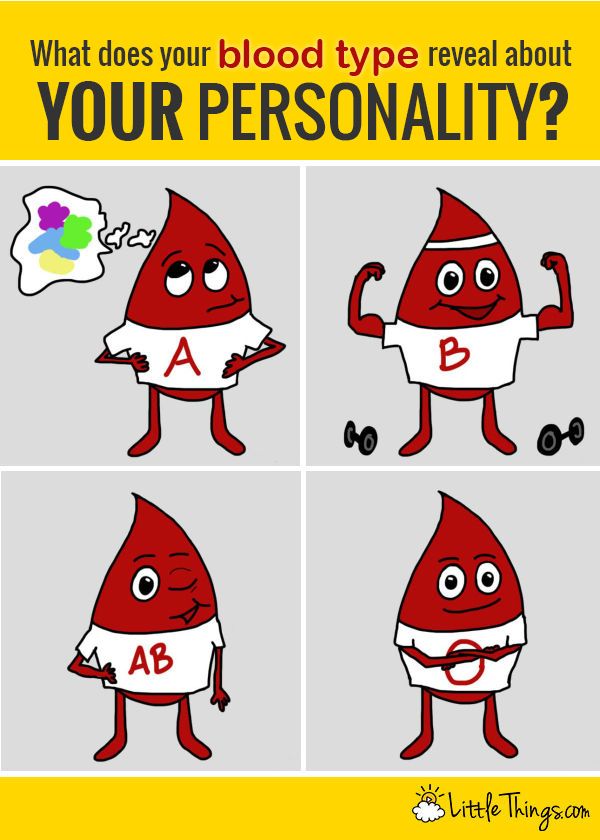 It was this that boiled in the veins of primitive people when they had to fight for survival and get their livelihood by hunting. And it is still believed that the owners of the first blood group (in the Japanese classification 0) are strong, ambitious and decisive people, born leaders who are able to lead. They do not waste time on reflection, but move towards their goal step by step.
It was this that boiled in the veins of primitive people when they had to fight for survival and get their livelihood by hunting. And it is still believed that the owners of the first blood group (in the Japanese classification 0) are strong, ambitious and decisive people, born leaders who are able to lead. They do not waste time on reflection, but move towards their goal step by step.
Physical activity and overcoming difficulties are simply vital for them, otherwise they begin to wither, lose their shape and fall into depression. Among the owners of the first blood group, there are most lovers of extreme sports. Difficulties do not frighten them, and the hunter's intuition and innate optimism help them find the right path and not give up. The owners of this blood type are well versed in politics and economics, and therefore often become heads of large corporations and even heads of state.
They know how to win over people, they are friendly and welcoming. Often become the soul of the company.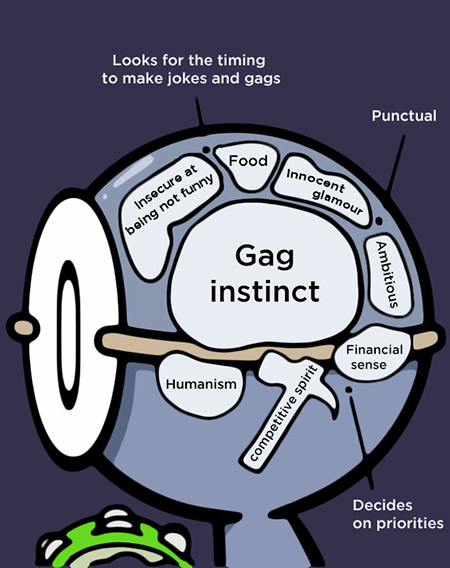 True, many do not like their excessive self-confidence. "Hunters" do not tolerate criticism, despite the fact that they themselves are quite straightforward. In personal relationships, they can torment with their exactingness and jealousy. Although most of all they ask from themselves.
True, many do not like their excessive self-confidence. "Hunters" do not tolerate criticism, despite the fact that they themselves are quite straightforward. In personal relationships, they can torment with their exactingness and jealousy. Although most of all they ask from themselves.
Famous people with the first blood type: Ronald Reagan, Mikhail Gorbachev, Queen Elizabeth II of Great Britain, Al Capone, John Lennon.
Blood type II (A) "Farmers"
This blood type appeared a little later, when people began to settle in communities and learned to cultivate the soil. They are not characterized by the love of adventure and risk that drives the "hunters". They are conservative, reliable and practical. "Farmers" prefer stability and measured life in one place.
That is why they try to streamline everything around them – at work, at home, in their personal lives. In Japan, employers prefer to hire this group of people. These are ideal, disciplined hard workers, but they need a leader: people of the second group are more comfortable hiding behind someone's back and not conflicting with anyone. They are very scrupulous, so they can succeed in professions such as an accountant, pharmacist, programmer, lawyer.
They are very scrupulous, so they can succeed in professions such as an accountant, pharmacist, programmer, lawyer.
Farmers are terrible perfectionists. On the one hand, this allows them to succeed, on the other hand, it undermines the nervous system. In appearance, they are calm, patient and easily adapt to circumstances. However, inside they are often tormented by anxieties and fears and simply do not know how to relax.
Relations with other people they develop perfectly. The owners of the second blood group are able to win over and take care of others. If they promise something, they will definitely do it. But if someone else fails or offends them, they will remember it for a long time.
The farmer's house is exemplary. They can truly dissolve in family life, but they also expect reciprocal dedication.
Famous people with the second blood group: Adolf Hitler, George W. Bush, Richard Nixon, Viktor Tsoi, Britney Spears.
III blood group (B) "Nomads"
This blood type appeared relatively recently.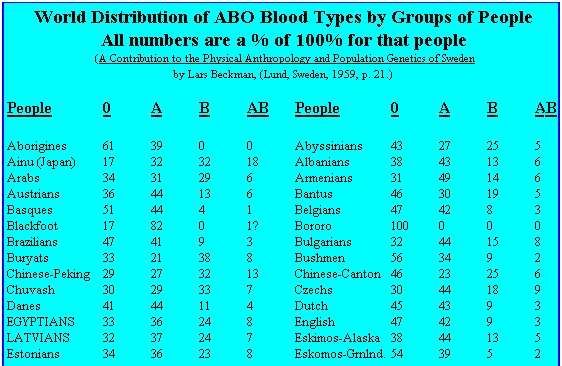 When people learned to provide themselves with everything they needed, they began to travel the world in search of a better life and new experiences. And so the "nomads" appeared.
When people learned to provide themselves with everything they needed, they began to travel the world in search of a better life and new experiences. And so the "nomads" appeared.
By nature they are individualists who are very jealous of their freedom. Any attempt to lock them in four walls is doomed to failure. They constantly need to change the situation, travel, gain new experience. But they are in no hurry to put down roots and acquire connections. The owners of this blood type are only interested in their inner circle, for which they are ready to move mountains.
They are inquisitive and learn new information easily, but because of this they quickly become bored. "Nomads" find it difficult to focus on one thing. As a result, nervousness, fuss, and sedatives are their frequent companions in life.
There are many wealthy people among the owners of the third blood type. But the Japanese often refuse to hire them, because they have a reputation for being selfish and intractable people.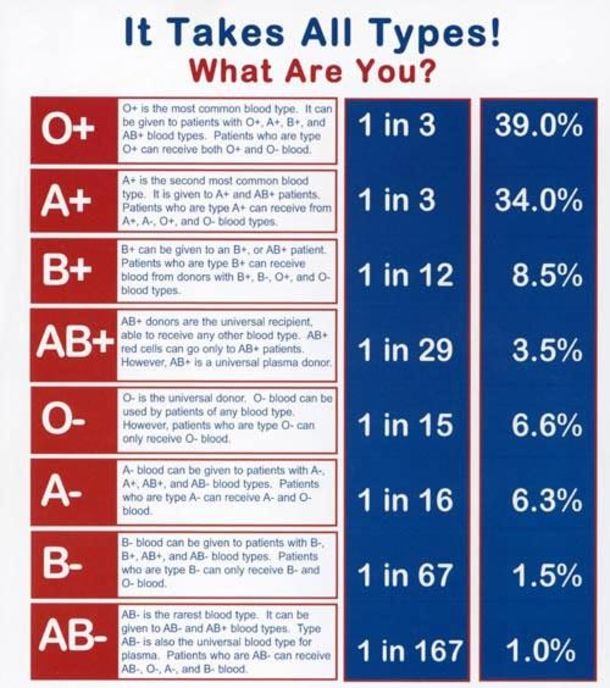 Although, in fact, unlike the "hunters", they do not go ahead with their goal, but achieve it as deliberately and diplomatically as possible.
Although, in fact, unlike the "hunters", they do not go ahead with their goal, but achieve it as deliberately and diplomatically as possible.
But despite the apparent aloofness, "nomads" are very sensitive to the moods of others, they are able to sympathize and empathize. This makes them good psychologists, journalists, politicians, public figures, diplomats and even detectives.
They love to flirt, but over time they become exemplary family men.
Famous people with the third blood type: Albert Einstein, Paul McCartney, Akira Kurosawa, Leonardo DiCaprio, Jack Nicholson.
IV blood group (AB) "Riddle"
This is the youngest and rarest blood type, which appeared as a result of mixing the rest. Its owners are so subtle in nature that they are called "mystery" or "bohemian".
They really have a complete set of qualities of celestials: a subtle creative nature, hypersensitivity, eccentricity, artistry, the ability to win over others. Representatives of the "bohemia" are incredibly sweet and charming.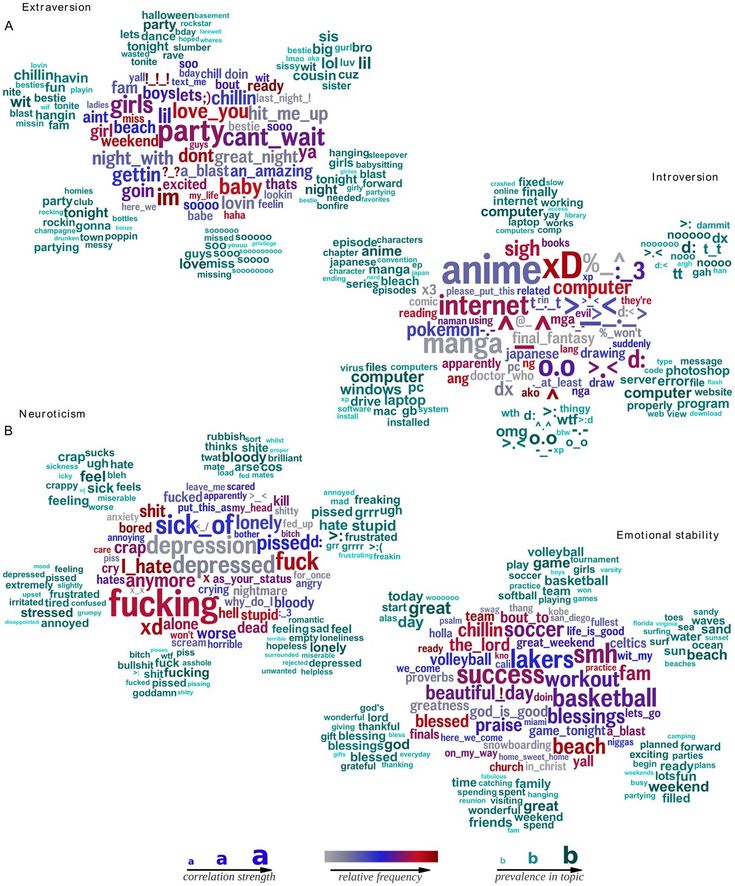 They are able to listen and understand others. Often they become good organizers, because they know how to take into account the characteristics and interests of everyone.
They are able to listen and understand others. Often they become good organizers, because they know how to take into account the characteristics and interests of everyone.
People with the fourth blood group have a very developed intuition, up to extrasensory abilities. Premonitions, as a rule, never let them down, so they manage to achieve high results in life. They make good scientists, thinkers, philosophers, travelers, actors, teachers, social workers.
The personal life of the owners of the fourth blood group, as a rule, develops successfully. They are able to adapt to the other and create a sense of harmony. But this does not mean that they will easily give up their interests. Their angelic patience can very quickly be replaced by a fit of anger, in a fit of which they are cruel and unfair. But then again they become the embodiment of cuteness. It is because of such emotional swings that the representatives of the “bohemian” are also considered the most unpredictable.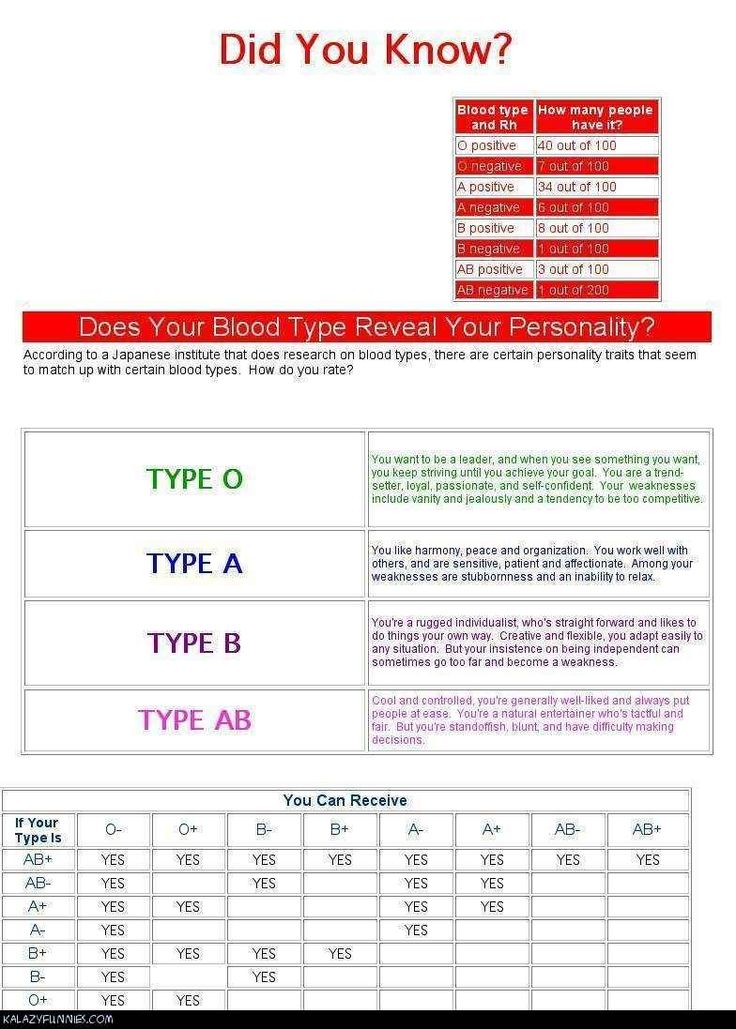
Famous people with the fourth blood group: John F. Kennedy, Marilyn Monroe, Mick Jagger, Jackie Chan.
There is a version that Jesus Christ had the fourth blood group. Its supporters say that the proof of this is a blood test found on the Shroud of Turin.
Rita Groupage
Japanese blood type | Japanese online
Do you know your blood type? What about your family members?
Here we know, and even know what blood type, or 血液型(けつえきがた,ketsuekigata), all of our friends have. And we are not alone in this knowledge. According to a survey conducted in 2016 among 3,355 Japanese respondents, 99% of them know their blood type. But why do they need it?
血液型(けつえきがた)
Blood type
In Japan, blood type is considered an indicator that affects a person's character. There is even a "Japanese blood type personality theory". Although it may seem far-fetched, many people believe that blood type means a lot. In fact, the above survey showed that 29% of men and 45% of women believe this.
In fact, the above survey showed that 29% of men and 45% of women believe this.
Read our article if you are going to visit Japan and get close to the Japanese people. Understanding the Japanese obsession with blood types can help you make new friends and blend in. In addition, you will learn where these beliefs come from and why they influence the Japanese mind so strongly.
Japanese blood type personality theory
There are four blood types. In domestic medicine, they are called, respectively, the first, second, third and fourth groups. The international classification has other designations: O, A, B, AB. The article will use the usual classification for us, and the international designation is indicated in brackets.
Japanese interest in blood types stems from the idea that blood type affects a person's personality, and therefore, knowing the blood type, you can guess what kind of person is in front of you and whether you are suitable for each other.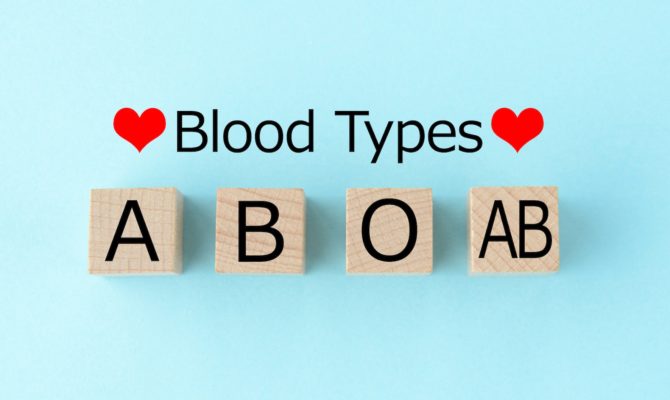 Each blood group has its own set of personality traits. Therefore, in Japan, when someone acts in a characteristic way, they like to say jokingly: “Of course, you did this, and not otherwise. You have the third blood group.”
Each blood group has its own set of personality traits. Therefore, in Japan, when someone acts in a characteristic way, they like to say jokingly: “Of course, you did this, and not otherwise. You have the third blood group.”
Some people build their romantic and friendship relationships based on this theory. Having information about blood types makes it easier to communicate and helps people to be more open with each other.
People with certain blood types are more suited to each other (or they want to believe it).
So when a Japanese asks you:
血液型、何型? (けつえきがた なにがた, ketsuekigata nani gata) What is your blood type?
Don't be scared! Nobody is looking for a donor. Such a question simply expresses curiosity about you as a person, as if you were asked: “Who are you according to the horoscope?”
Of course, to understand this question, you need to be able to speak at least a little Japanese, and our online school will help you learn this.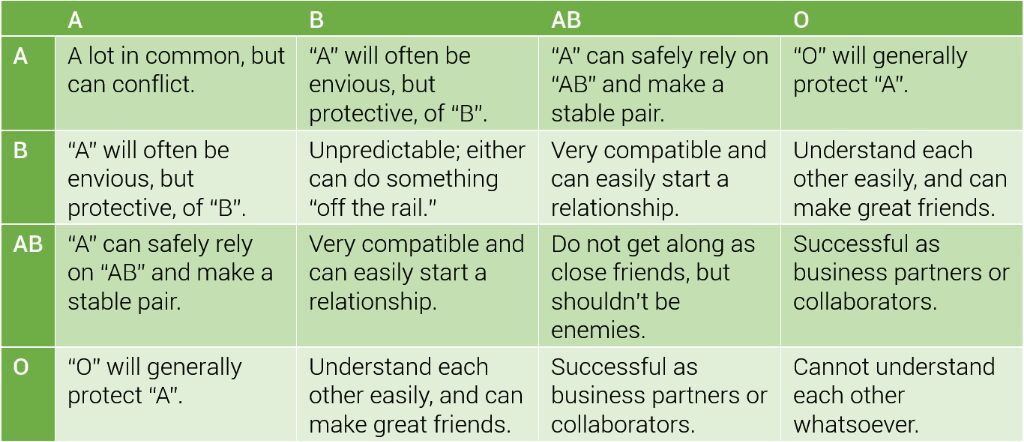 All the details about the courses - at the link!
All the details about the courses - at the link!
And now there will be something interesting! Do you want to try on the theory of personality by blood types? Find out if your personality matches your blood type? Take a look at the diagram below. And don't worry if you're Rh negative or Rh positive, that's important in the medical office, but not here.
| Blood type | Number of people with this group in Japan | Positive features | Negative traits |
| First (O) | 30% | easy-going, leadership | insensitive, non-punctual |
| Second (A) | 40% | serious, neat | stubborn, anxious |
| Third (B) | 20% | enthusiastic, creative | selfish, intractable |
| Fourth (AB) | 10% | talented, discreet | eccentric, duplicitous |
Let's study this topic in more detail. If you know your blood type, check how well these descriptions fit you.
If you know your blood type, check how well these descriptions fit you.
People with type I blood are often described as 楽観主義 (らっかんしゅぎ, rakkanshugi ), i.e. optimistic. These people are sociable, have leadership qualities and are often the soul of the company. They do not worry about trifles, and their behavior sometimes frightens the more sensitive people with the second blood type. Although people with the first blood group are not always punctual, often late for events and are rude, the following are among their undeniable advantages: they are incredibly stable and flexible, which helps them survive any adversity.
optimistic
| optimistic | easy going | leader | insensitive |
| non-punctual | calm | confident | independent |
| strong-willed | intuitive | self-centered | cold |
| unpredictable | workaholic | sociable | energetic |
| social | flexible | realistic | financial responsible |
| flexible | romantic | careful | devotee |
| peaceful | carefree | impressionable | uncertain |
| emotional | ambitious | pioneer | independent |
| loyal | sports | rigid | addicted |
| compromising | arrogant | narcissistic | jealous |
| cruel | coarse | copycat |
Most Japanese people have the second blood type.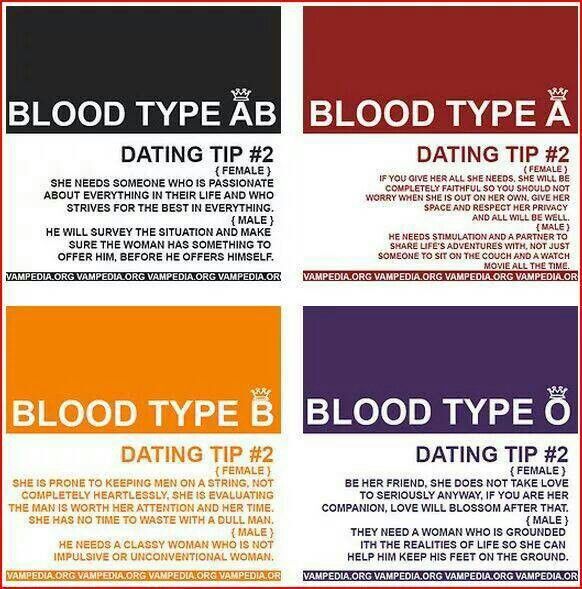 People with this group are called 几帳面 (きちょうめん, kichoumen) or well organized. They are neat and like to keep the space around them in order. They also value relationships with other people. Of the negative traits, they often have stubbornness, and they also easily lose their temper.
People with this group are called 几帳面 (きちょうめん, kichoumen) or well organized. They are neat and like to keep the space around them in order. They also value relationships with other people. Of the negative traits, they often have stubbornness, and they also easily lose their temper.
几帳面
well organized
| timid | modest | alarming | honest |
| sensitive | stubborn | thrust | discreet |
| patient | responsible | fastidious | tense |
| tactful | shy | closed | polite |
| perfectionist | stressed | conscientious | careful |
| kind | diligent | attentive | calm |
| reliable | nervous | neat |
People with the third blood type are generally described as 自己中 (じこちゅう, jikochuu), or selfish.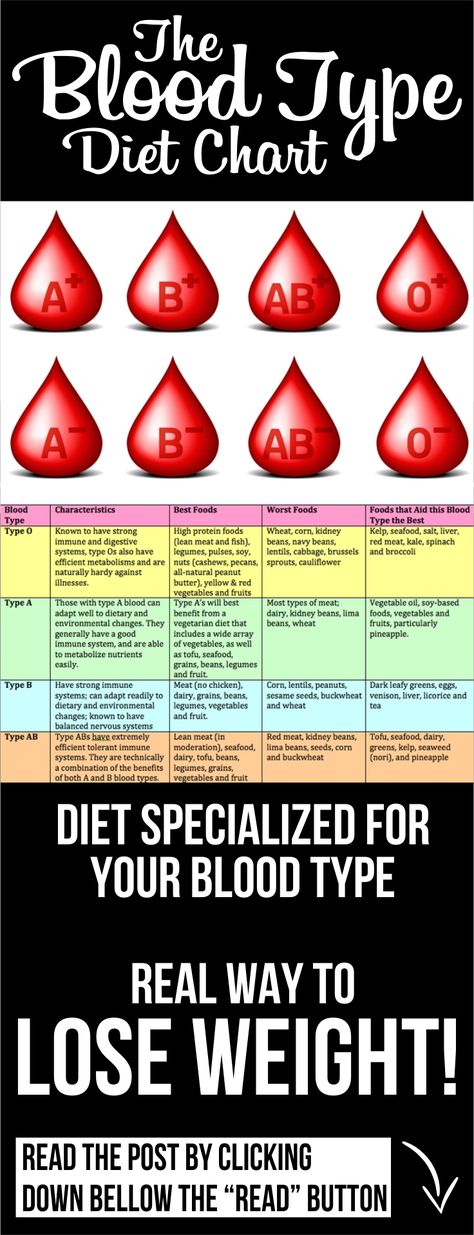 Although people with this group have many positive traits, others tend to notice their negative sides more. Why? We'll talk about this later.
Although people with this group have many positive traits, others tend to notice their negative sides more. Why? We'll talk about this later.
They are renowned for their creativity. People with the third blood group are very curious and addicted, and at the same time they often quickly lose interest.
自己中 (じこちゅう)
selfish
| selfish | addicted | crazy | wildish |
| active | intractable | creative | strong |
| irresponsible | unforgiving | unforged | free |
| extraordinary | modest | pragmatic | flexible |
| curious | cheerful | sociable | bold |
| indecisive | unpredictable |
The fourth group is a mixed type group that emerged from the second and third groups. This also influenced the characters of the people who have this group. They seem to combine two personalities. Such people are often characterized as ambivalent and complex. For example, they are shy, like people with the second group, and at the same time sociable, like the carriers of the third. The fourth group is the rarest, and Japan is no exception. Here, only 10% of the population have this group. The fact that there are very few people with the fourth group reinforces the stereotype that these are eccentric people and great originals.
This also influenced the characters of the people who have this group. They seem to combine two personalities. Such people are often characterized as ambivalent and complex. For example, they are shy, like people with the second group, and at the same time sociable, like the carriers of the third. The fourth group is the rarest, and Japan is no exception. Here, only 10% of the population have this group. The fact that there are very few people with the fourth group reinforces the stereotype that these are eccentric people and great originals.
変わり者(かわりもの)
eccentric
| talented | calm | rational | artistic |
| withdrawn | cold | two-faced | controlled |
| social | critical | indecisive | forgetful |
| irresponsible | shy | outgoing | reliable |
| self-centered | sensitive | thrust | religious |
| quiet | mysterious | vulnerable | complex |
| closed | creative | eccentric | charming |
| impatient | proud | diplomatic | legible |
| popular | adaptable |
Blood Type Compatibility
You might be wondering which blood types work best with each other and which don't. We will tell you what the Japanese blood type theory of personality says about this. In other theories you can find different information, the interpretation may differ, depending on how people interpret common stereotypes.
We will tell you what the Japanese blood type theory of personality says about this. In other theories you can find different information, the interpretation may differ, depending on how people interpret common stereotypes.
First group
- O × O: Although their honest dealings with each other can form the basis of a close and trusting relationship, they tend to clash when it comes to competition.
- O × A: People with blood types 1 and 2 have very different personalities (people with blood types 2 are very sensitive, which cannot be said about people with blood types 1). They can both compensate for each other's weaknesses, and become enemies due to too strong differences.
- O × B: People of the first blood type are patient and understanding, they can enjoy communicating with freedom-loving people of the third type, while at the same time giving them support. Good combination!
- O × AB: For simple and honest people with the first group, it may be difficult at first to understand complex dual people with the fourth.
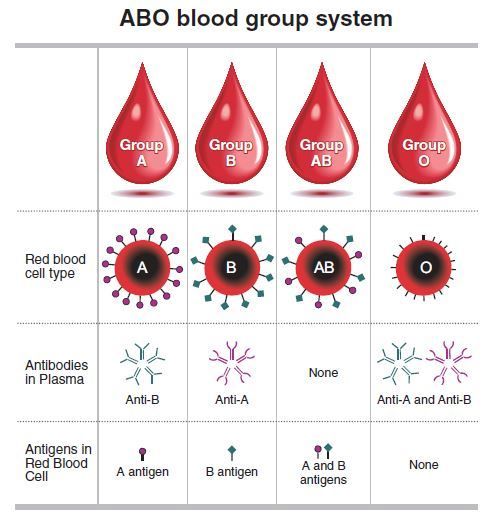 But their cheerfulness and empathy can help people with the fourth blood type go through difficulties, and through this, close relationships can develop between them.
But their cheerfulness and empathy can help people with the fourth blood type go through difficulties, and through this, close relationships can develop between them.
Second group
- A × A: Empathy and affection arise between these similar people, but sometimes they can annoy each other due to the hypersensitivity of both.
- A × B: Type 2 people admire the ability of type 3 people to enjoy life and move at their own pace. In turn, people with the third group are uncomfortable with the fact that people with the second group show their feelings too brightly, their adoration seems obsessive.
- A × AB: The success of this combination depends on the individual. As we have already said, the fourth group (or type AB) is mixed and contains features of both groups. Type A will not be able to get along with type AB, who has overdeveloped traits of type B (here we are talking primarily about negative traits, such as egocentrism).
 However, if type AB has more developed traits of type A, they can build a stable relationship with A.
However, if type AB has more developed traits of type A, they can build a stable relationship with A.
Third group
- B × B: This combination can be one of the best possible, if the preferences of the partners coincide or they adjust to each other. If not, this combination may be the worst possible.
- B × AB: People with the third blood type need time to slowly solve things at their own pace. And people with the fourth blood group sometimes need to be alone. Both of them respect each other's needs. Thus, they will have a good relationship if they do not interfere with each other.
The fourth group
- AB × AB: The fourth group is quite rare, so people of this type, having met, immediately feel mutual understanding and strong attraction. One complex personality can understand another well like no other, so deep relationships are possible in this union.
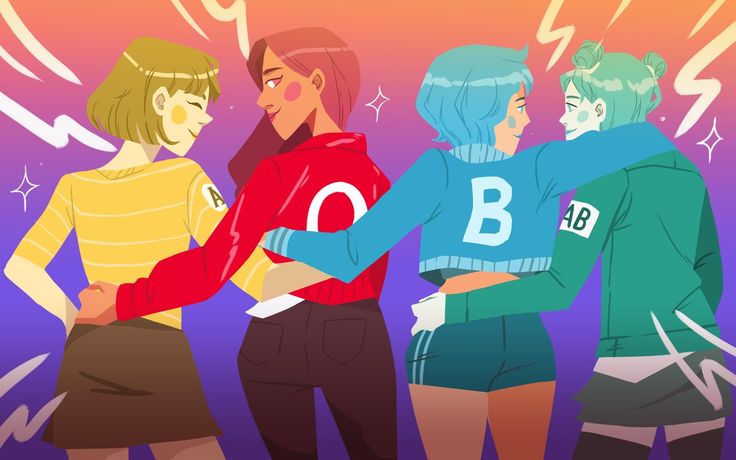
Relationships based on blood type compatibility do not have to be romantic. But still, romantic relationships interest us the most. So, a marriage agency in Tokyo called Celebrity collected statistics on successful marriages by blood type based on their database. They identified the matches most likely to lead to marriage:
| Men | Women | ||
| 1 | first blood type | x | second blood type |
| 2 | second blood type | x | second blood type |
| 3 | first blood type | x | third blood group |
| 4 | first blood type | x | first blood type |
Are there couples among your acquaintances who fit this statistic? If yes, then you should expect that you will receive an invitation to the wedding soon.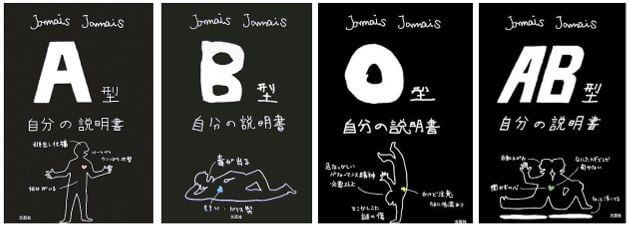
One would expect that a modern, technologically advanced country like Japan would leave old-fashioned, unscientific beliefs about blood types in the past, but that was not the case. You are wrong. The Japanese, especially women, talk about blood type personality theory quite often in everyday life, it is also one of the most common topics during various kinds of meetings.
Some people are so addicted to this topic that they avoid meeting and communicating with anyone who does not match their blood type.
And this is just the tip of the iceberg. Japan has a plethora of products and services related to blood types, ranging from books, movies and dating services to chocolate.
Many people like to read, so naturally there are a number of books on blood types. One of the most popular book series is Your Blood Type Manual Series (血液型自分の説明書シリーズ (Your Blood Type Manual Series). Many physiological and behavioral characteristics are presented in these books
for blood types, which are explained with simple illustrations.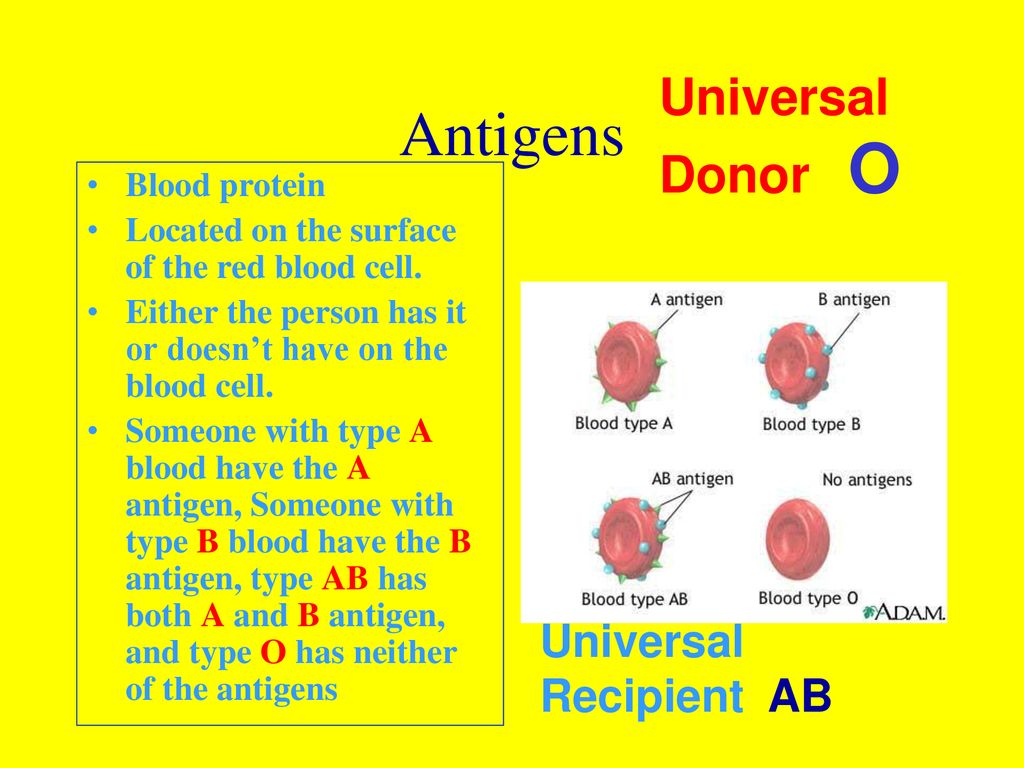 This series has gained immense popularity, with about 620 million copies of the books sold. Moreover, a mobile application was created based on it and a DVD disc was released.
This series has gained immense popularity, with about 620 million copies of the books sold. Moreover, a mobile application was created based on it and a DVD disc was released.
But why does everything depend on relationships? Why not be guided by your blood type when choosing food? There are books like this too! “Blood Type Diet: Each Blood Type Has Its Own Special Diet”0061 ). This is a series of books that recommends a specific eating plan based on your blood type. The author of the book, Fumiyasu Nakashima, is a chiropractor and writes books and articles on the topic of health. His blood type diet is rooted in history and is based on what links each blood type to human communities in prehistoric times. For example, blood type A is associated with agricultural people, so their ideal diet is mainly vegetables and rice.
There are also movies, TV shows and anime about blood types. The blood type helps to relate to the character and better understand his character.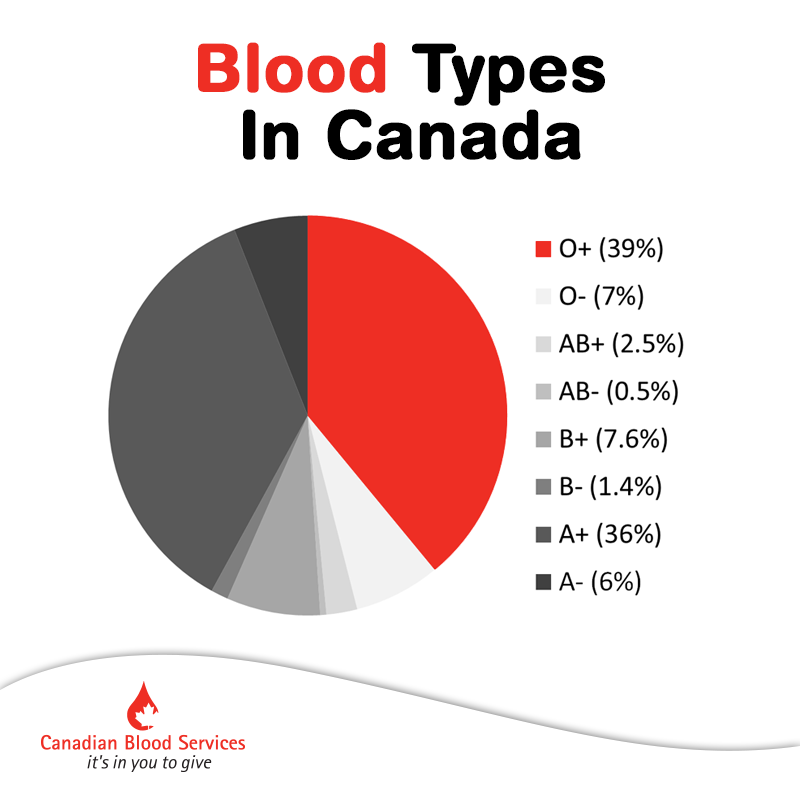 For example, there is the series “How Women Get Married Based on Their Blood Type” (How Women Get Married Based on Their Blood Type). This is a series consisting of four episodes, telling about four women with different blood types, respectively. The series aired on Fuji TV in 2009.
For example, there is the series “How Women Get Married Based on Their Blood Type” (How Women Get Married Based on Their Blood Type). This is a series consisting of four episodes, telling about four women with different blood types, respectively. The series aired on Fuji TV in 2009.
“Ketsuekigata Kun” 血液型けつえきがたくん is a short anime based on a comic book by Real Crazy Man. The story features 8 characters of both sexes, carriers of different blood types. Interestingly, each character is voiced by an actor with the corresponding blood type. Each episode focuses on a specific topic, such as love, career, or everyday life. This anime shows how people with different blood types react to different situations.
Many Japanese dating sites ask you to enter your blood type on your profile, which once again shows how important this information is in Japanese society. There are also services that look for a partner exclusively by blood type and put this information as a priority.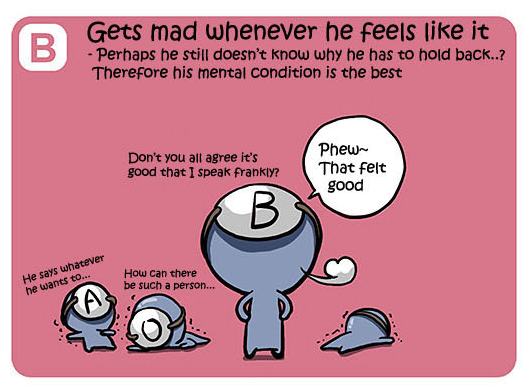
Attention! The Japanese even have a blind date (“gokon”) based on blood type compatibility.わくわく 血液型 合コン (わくわくけつえきがたごうコン, wakuwaku ketsuekigata goukon) are dating parties where men and women are grouped based on their blood type. On the site of dating services based on blood group compatibility, there are many positive reviews from people who have found their soul mate in this way.
Akiba:F 献血ルーム (けんけつルーム, kenketsu ruumu) is the most interesting and strangest blood transfusion center located in Akihabara. Foreigners can also donate blood here, but there are some restrictions, and besides, the entire service is provided in Japanese. Find out your blood type and feel the atmosphere of Akihabara. The center has free wi-fi, manga, magazines, snacks and drinks to keep you entertained while you wait in line.
How did people become interested in blood groups? And why is this theory so widespread in Japan? Answer: Someone just made a few random observations.
In 1927, the psychologist Takeji Furukawa worked as a teacher at a university-affiliated girls' school.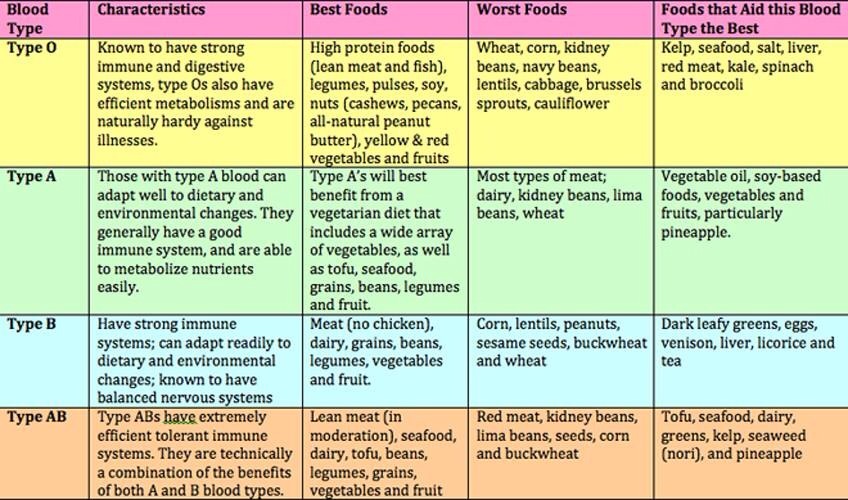 He began to question the school's entrance examination system, which was based solely on academic ability. He wanted to create a system that would also take into account the identities of applicants.
He began to question the school's entrance examination system, which was based solely on academic ability. He wanted to create a system that would also take into account the identities of applicants.
Inflamed with this idea, he began to observe eleven members of his family and, by the way, noted their blood types. He did not have a single person with the fourth group in his family, so at that time he combined the fourth group with the second. But, nevertheless, with this incredibly small focus group and the absence of a representative with a fourth blood type, he wrote his famous dissertation “Studying Human Temperament by Blood Type”. Although the academic community did not accept Furukawa's theory at 1933, this theory gained too much popularity and did not go unnoticed.
After World War II, the debate about blood types and their relationship to human personality subsided for a while. But in the 1970s, a journalist named Masahiko Nomi, inspired by Takeji Furukawa's theory, published a book on the relationship between blood type and personality.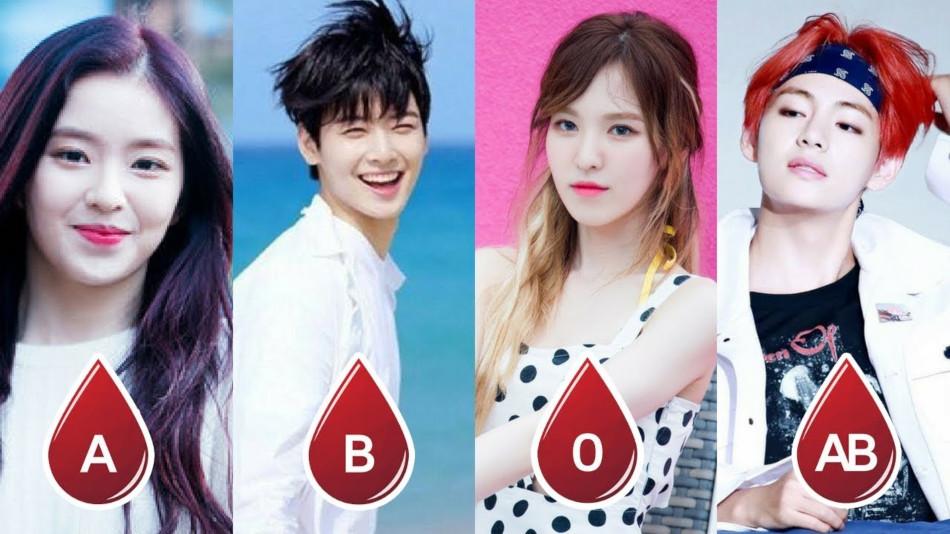 This book became a bestseller and helped make the theory even more popular. By the 1980s, echoes of the theory began to appear in music, magazines, and television broadcasts. Finally, the time for Furukawa's blood type theory has come!
This book became a bestseller and helped make the theory even more popular. By the 1980s, echoes of the theory began to appear in music, magazines, and television broadcasts. Finally, the time for Furukawa's blood type theory has come!
Then again there was a quiet period until the 2000s due to the emerging problem of blood type discrimination and the emerging movements against the theory of blood types. And although people continued to believe in the theory of the relationship between blood type and personality, the media stopped raising this topic for a while.
This series of events created many fanatical believers in the blood type theory in Japan. But, in fact, there is no scientific evidence to support this theory. So why do people still believe it? From a psychological point of view, the theory of blood types has always been a controversial topic. There have been attempts to find out the statistical relationship between blood types and personalities, but so far nothing has been proven.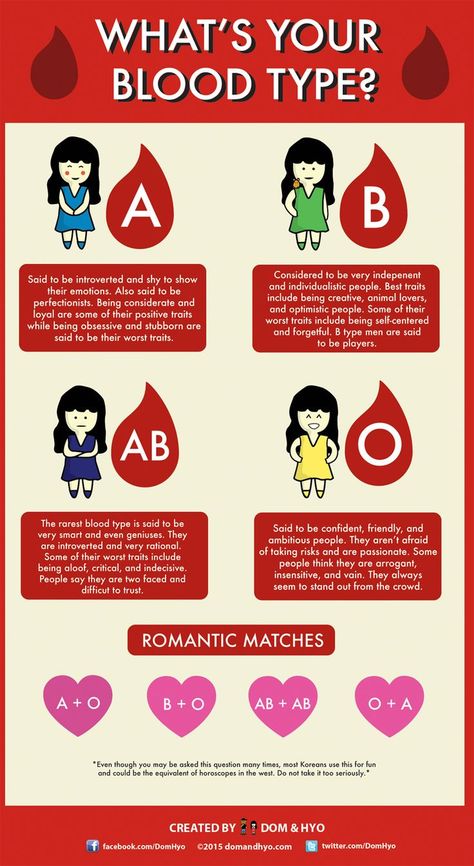 A lot of research has been done on the social phenomenon itself, and as a result, scientists have come to the conclusion that bias and the desire to believe is the main reason for people's beliefs.
A lot of research has been done on the social phenomenon itself, and as a result, scientists have come to the conclusion that bias and the desire to believe is the main reason for people's beliefs.
It is clear that the theory of blood types is not based on any evidence confirmed by science and believing in it is like reading horoscopes. But when you meet people whose personalities fit so well with their blood types, you involuntarily think and start to believe.
The blood type theory is not always fun and romantic. Thus, she gave rise to a social phenomenon called ブラハラ (burahara, short for blood harassment). The blood type charts above look well balanced, don't they? Each type has its own set of strengths and weaknesses. But in the real world, some of these traits get a lot of attention, while others are completely ignored.
The third blood group is the most disadvantaged group in Japan (this was written above). About people with the third group they write that they are selfish and intractable people.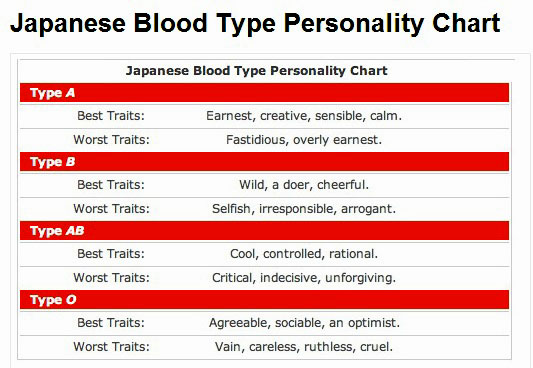 They also write about them that they are creative and addicted, but positive features, as a rule, are overshadowed in the minds of people by negative ones. When you tell people in Japan that you have type 3 blood, they ignore the positive aspects of your character and start teasing you by saying things like:
They also write about them that they are creative and addicted, but positive features, as a rule, are overshadowed in the minds of people by negative ones. When you tell people in Japan that you have type 3 blood, they ignore the positive aspects of your character and start teasing you by saying things like:
ne! wakaru wakaru! attya Bippoimon) Oh, I knew that! I could have guessed that you are B, because you look so much like type B.
Actually, this exclamation means “Of course you have a third group! You are selfish and intractable, I will now mean it.”
Perhaps the discrimination was due to statistics. Due to the fact that the third group is less popular in Japan than the second and first. But why, then, did this phenomenon bypass the fourth group?
- second group (A) = 40%
- first group (O) = 30%
- third group (B) = 20%
- fourth group (AB) = 10%
The third group is in the minority, and as is the case in many situations, people in the minority are at a disadvantage.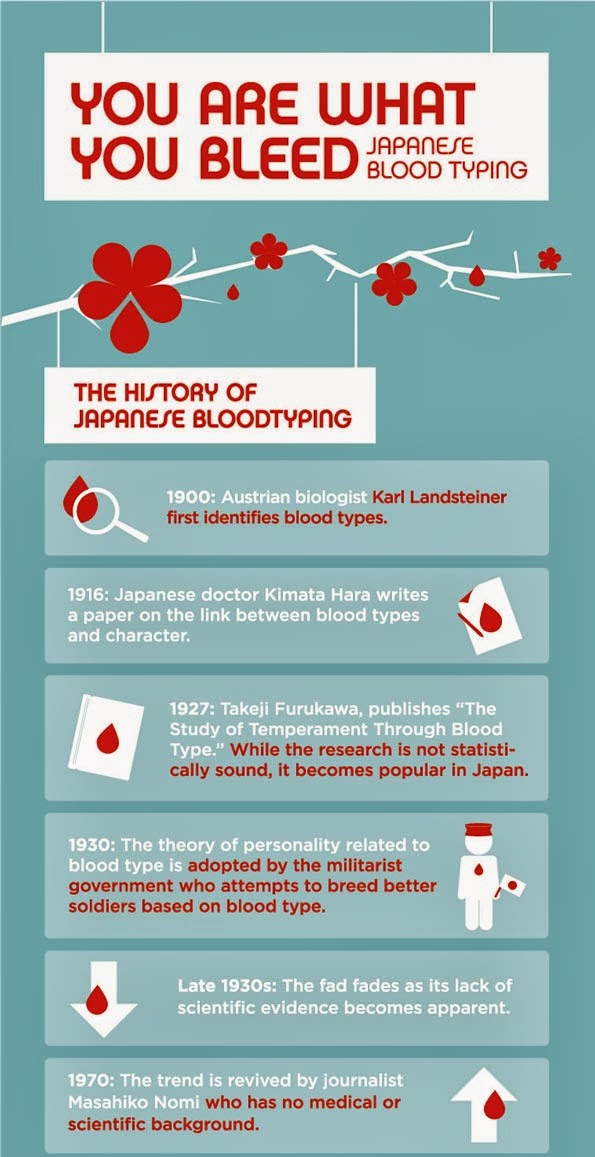 Although there are even fewer people with the fourth group than with the third, the third group is bullied more often because people with the fourth blood type are too rare (in Japan they are only 10% of the population). In everyday life, you have not encountered enough people with the fourth group to know if they really fit the stereotype.
Although there are even fewer people with the fourth group than with the third, the third group is bullied more often because people with the fourth blood type are too rare (in Japan they are only 10% of the population). In everyday life, you have not encountered enough people with the fourth group to know if they really fit the stereotype.
The next group most often discriminated against is the first. When a person behaves rudely or abruptly, for example, even if he tears open a package of sweets, he may be asked if he has the first blood type.
It is rare that the second group, the most common in Japan, is bullied, but it does happen. For example, if someone says, "It doesn't look like you have a second blood type..." what they really mean is, "You are not organized enough, even though you have a second blood type." Thus, people are repressed for not living up to the positive expectations placed on them.
However, this topic of discrimination against people with certain blood types is not closed. People who belong to a minority fight back.
People who belong to a minority fight back.
One of the biggest proponents of the blood type-personality theory in Japan is TV shows, so in recent years there have been more and more complaints about these shows.
In 2004, the Broadcasting Ethics and Improvement Organization sent requests to television shows to stop encouraging people to believe that blood type affects personality. This helped to reduce the number of broadcasts on this topic a little. And that's why there are fewer blood type programs now than there were 10 years ago.
Unfortunately, blood type discrimination is so widespread that it can even affect your career. Thus, information about the blood type was used as a criterion in the selection for work and during the entrance exams to the university. Although the government has issued a warning to companies about their requirement to provide information about the blood type of an applicant for a job, in particular cases, if a particular employer believes in the theory of the relationship between blood type and personality, a person may still face the problem of discrimination.